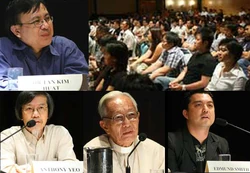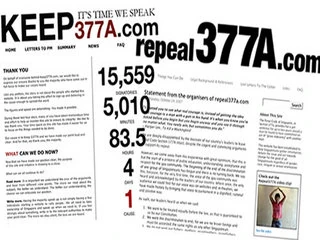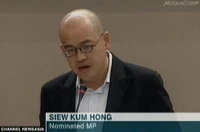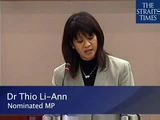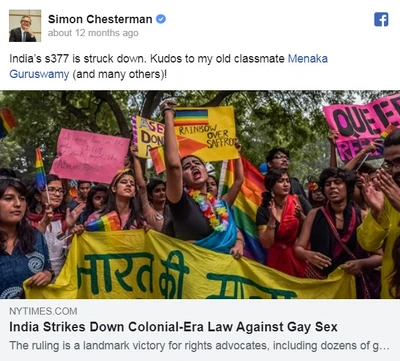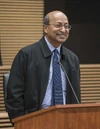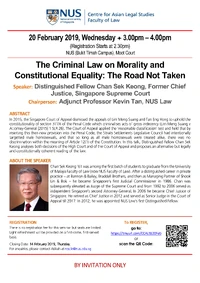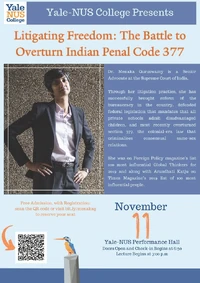| Line 840: | Line 840: | ||
On Tuesday, 31 March 2020, all 3 plaintiffs announced that they would be appealing the [[High Court]]'s ruling[https://www.channelnewsasia.com/news/singapore/all-three-men-to-appeal-dismissal-of-their-challenges-against-12592934]. |
On Tuesday, 31 March 2020, all 3 plaintiffs announced that they would be appealing the [[High Court]]'s ruling[https://www.channelnewsasia.com/news/singapore/all-three-men-to-appeal-dismissal-of-their-challenges-against-12592934]. |
||
| − | =Roy Tan files |
+ | =Roy Tan files High Court application for mandatory order compelling Cabinet to move Bill in Parliament to repeal 377A= |
: ''See also: [[Remedies in Singapore administrative law]]'' |
: ''See also: [[Remedies in Singapore administrative law]]'' |
||
On 1 December 2020, [[Roy Tan]], filed an application in the [[High Court]] seeking a [[declaration]] that Section 377A of the Penal Code was incongruent and inconsistent with [[Section 119 of the Penal Code (Singapore)|Sections 119]] and [[Section 176 of the Penal Code (Singapore)|176]] of the [[Penal Code]], [[Section 17 of the Criminal Procedure Code (Singapore)|Sections 17]] and [[Section 424 of the Criminal Procedure Code (Singapore)|424]] of the [[Criminal Procedure Code]], [[Section 9A (1) of the Interpretation Act]] and [[Article 9 of the Constitution of Singapore|Articles 9(1)]] and [[Article 12 of the Constitution of Singapore|12(1)]] of the [[https://the-singapore-lgbt-encyclopaedia.wikia.org/wiki/Constitution_of_Singapore|Constitution of the Republic of Singapore]]. He also argued that the [[Attorney-General]]’s position - that it would naturally follow that any prosecution under other provisions which would contradict the non-prosecution stance for male [[homosexual]] adults indulging in [[consensual]] sex in private would likewise not be in the public interest - rendered Section 377A [[otiose]] [[a fortiori]]. |
On 1 December 2020, [[Roy Tan]], filed an application in the [[High Court]] seeking a [[declaration]] that Section 377A of the Penal Code was incongruent and inconsistent with [[Section 119 of the Penal Code (Singapore)|Sections 119]] and [[Section 176 of the Penal Code (Singapore)|176]] of the [[Penal Code]], [[Section 17 of the Criminal Procedure Code (Singapore)|Sections 17]] and [[Section 424 of the Criminal Procedure Code (Singapore)|424]] of the [[Criminal Procedure Code]], [[Section 9A (1) of the Interpretation Act]] and [[Article 9 of the Constitution of Singapore|Articles 9(1)]] and [[Article 12 of the Constitution of Singapore|12(1)]] of the [[https://the-singapore-lgbt-encyclopaedia.wikia.org/wiki/Constitution_of_Singapore|Constitution of the Republic of Singapore]]. He also argued that the [[Attorney-General]]’s position - that it would naturally follow that any prosecution under other provisions which would contradict the non-prosecution stance for male [[homosexual]] adults indulging in [[consensual]] sex in private would likewise not be in the public interest - rendered Section 377A [[otiose]] [[a fortiori]]. |
||
| − | Tan, represented by lawyer [[M Ravi]], furthermore sought a [[ |
+ | Tan, represented by lawyer [[M Ravi]], furthermore sought a [[mandatory order]] compelling the members of the [[Cabinet]] to move a [[Bill]] in [[Parliament]] to repeal Section 377A because the latter has become [[dead letter]] and its retention in the face of [[Section 17 of the Criminal Procedure Code (Singapore)|Sections 17]] and [[Section 424 of the Criminal Procedure Code (Singapore)|424]] of the [[Criminal Procedure Code]], [[Section 119 of the Penal Code (Singapore)|Sections 119]] and [[Section 176 of the Penal Code (Singapore)|176]] of the [[Penal Code]] and [[Section 9A of the Interpretation Act]] was unlawful due to the [[Executive]]’s decision not the enforce Section 377A. Under [[Section 9A (1) of the Interpretation Act]], the courts were required to interpret a written law in a way that promoted the purpose or object underlying that law. [[Parliament]]'s undertaking not to proactively enforce Section 377A rendered the courts unable to perform their legal obligation. |
=See also= |
=See also= |
||
Revision as of 03:12, 3 December 2020
Section 377A of the Penal Code of Singapore is the main persisting piece of legislation which criminalises sex between mutually consenting males who are not below the legal age of consent (16 years in Singapore), even when it is done in private. In lay terms, it is known as the "gross indecency" law. This is the phrase commonly used by the press when routinely reporting on criminal cases charged under the statute.
- Consensual sex between males where one party is underaged is charged under commercial sex with a minor below 18, sex with a minor below 16 or statutory rape.)
- Non-consensual sex between males is charged under "assault or use of criminal force to a person with intent to outrage modesty" (Section 354 of the Penal Code[2]). Male on male rape is charged under Section 375 (1A) of the Penal Code[3]. Sexual assault involving penetration (eg. performing oral sex on another non-consenting male) is charged under Section 376 of the Penal Code. Victims are not charged. (See main article: Rape of males in Singapore).
"Gross indecency" is usually taken to mean all forms of non-penetrative sex (eg. mutual masturbation) between two males regardless of age. This stands in contrast with the former Section 377, known as the "unnatural sex law", which included only penetrative sex (mainly oral and anal) between two persons of any gender, meaning it did not discriminate between heterosexual and homosexual sex. After the repeal of the erstwhile Section 377 in 2007, a legal anomaly arose whereby non-penetrative sex between men was criminalised while more serious penetrative sex was not.
The Penal Code (Chapter 224): Chapter XVI: Offences affecting the human body: Sexual offences: Section 377A (Outrages on decency)[4] states:
"Any male person who, in public or private, commits, or abets the commission of, or procures or attempts to procure the commission by any male person of, any act of gross indecency with another male person, shall be punished with imprisonment for a term which may extend to 2 years."
Origin
To understand the background of Section 377A, the enactment of its mother statute, the original Section 377 which criminalised sex "against the order of nature" and was popularly known as the "unnatural sex" law, must first be explained. It banned penetrative sex (oral and anal) between two people regardless of gender if the act did not immediately lead to penile-vaginal intercourse which was considered the only form of "natural" sex as it had the potential of procreation.
The former Penal Code (Chapter 224): Chapter XVI: Offences affecting the human body: Sexual offence: Section 377 (repealed in 2007) stated:
"Whoever voluntarily has carnal intercourse against the order of nature with any man, woman or animals, shall be punished with imprisonment for life, or with imprisonment for a term which may extend to 10 years, and shall also be liable to fine.
Explanation. Penetration is sufficient to constitute the carnal intercourse necessary to the offence described in this Section."
Ecclesiastical roots in Britain under Henry VIII

Henry VIII, the monarch who enacted Britain's anti-sodomy laws.
An exhaustive analysis of the origin of British laws which sought to prohibit buggery and their evolution into Section 377 is found in a seminal academic paper by Prof. Douglas Sanders (see archive of the paper: 377 and the unnatural afterlife of British colonialism).
Prosecution by the Catholic Church
Prior to the enactment of the first civil anti-buggery law in Britain in 1533, the offences of buggery or sodomy had been dealt with by the Catholic Church. In the Church's early medieval years, these acts were given no particular penance. They were viewed like all the other sins[5]. Despite the extreme gravity with which the Church viewed "unnatural" vice, remarkably little conciliar legislation up to the 12th century was devoted to homosexuality. Considerably more was said about adultery, incest and concubinage. The penalty for sodomy, in pre-12th century and later legislation, was largely penitential and not judicial. One can only speculate whether this meant that the accused had to recite fifty Hail Marys upon conviction with sodomy rather than being imprisoned or physically castigated. In any case, it was extremely rare that men were brought up to the ecclesiastical courts for homosexual behavior alone. From 1470 to 1516, only 1 out of 21,000 church trials was for sodomy, and the accused was simply excommunicated when he failed to appear. In medieval Church law, individuals were more commonly charged for publicly standing up against the Church for its norms which looked down upon homosexuality. If they refused to back down from their "heresy", they were severely punished. The usual punishment for convicted heretics was death by burning at the stake.
The Buggery Act
The Buggery Act 1533, formally An Acte for the punysshement of the vice of Buggerie, was an Act of the Parliament of England piloted by Henry VIII's chief minister, Thomas Cromwell.
The Act prescribed death as the punishment for buggery with man or beast. Some have suggested that bestiality was specifically included because of the fear of hybrid births!
The phrasing used in the Buggery Act, which included the word "abominable" (taken from the Book of Leviticus in the Bible), in addition to "buggery" (which, by the 13th century, had become associated with sodomy and was later defined by the courts to include only anal penetration and bestiality) and "vice", confirms its religious character.
The Buggery Act 1533 stated:
"Forasmuch as there is not yet sufficient and condign punishment appointed and limited by the due course of the Laws of this Realm for the detestable and abominable Vice of Buggery committed with mankind of beast: It may therefore please the King's Highness with the assent of the Lords Spiritual and the Commons of this present parliament assembled, that it may be enacted by the authority of the same, that the same offence be from henceforth ajudged Felony and that such an order and form of process therein to be used against the offenders as in cases of felony at the Common law. And that the offenders being herof convict by verdict confession or outlawry shall suffer such pains of death and losses and penalties of their good chattels debts lands tenements and hereditaments as felons do according to the Common Laws of this Realme. And that no person offending in any such offence shall be admitted to his Clergy, And that Justices of the Peace shall have power and authority within the limits of their commissions and Jurisdictions to hear and determine the said offence, as they do in the cases of other felonies. This Act to endure till the last day of the next Parliament."
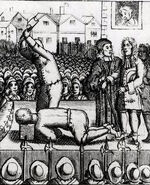
Walter Hungerford was the first man to be executed under the Buggery Act.
This meant that a convicted sodomite’s possessions could be confiscated by the government, rather than going to their next of kin, and that even priests and monks could be executed for the offence since it was a law enacted "without benefit of clergy". This was ironic, in view of the fact that priests and monks could not be executed even for murder. Henry VIII later used the law to exterminate monks and nuns (thanks to information his spies had gathered) and appropriate their monastery lands. The same tactics had been used 200 years before by Philip IV of France against the Knights Templar.
The Buggery Act was formulated in the context of Henry VIII's engineered break from papal authority to establish the Anglican church via the English Reformation. It bolstered Henry's position against the Catholic Church's courts. More practically, it aimed to justify the seizure of the Catholic monasteries and the confiscation of their other rich properties. The pretext was the alleged sexual immorality of those in the religious vocation. Without this anti-Catholic agenda, it seems unlikely that the Act would have been enacted. The use of the sodomy law, more than just going after people who engaged in homosexual intercourse, was thus also part of religious persecution.
In July 1540, contravention of the Act, along with treason, resulted in the first conviction. Walter Hungerford, 1st Baron Hungerford of Heytesbury, became the first person executed under the statute, although it was probably the treason that cost him his life. Being a nobleman, he was beheaded at Tower Hill, an elevated spot northwest of the Tower of London (commoners were hung at another public execution site, Tyburn). Ironically, Thomas Cromwell, the man who introduced the Buggery Act to parliament, was also beheaded there the very same day, on 28 July 1540, after he fell out of favour with Henry VIII. Nicholas Udall, a cleric, playwright and headmaster of Eton College, was the first to be charged for violation of the Act alone in 1541. In his case the sentence was commuted to imprisonment, and he was released in less than a year.
When the staunchly Catholic Mary I of England, Henry VIII's elder daughter, ascended the throne in 1553 and aggressively returned England to Catholicism, in spite of all the executions she ordered which earned her the nickname of Bloody Mary, she surprisingly struck down her father's sodomy law. Evidently, she did not do this because of prevailing Catholic policy during the time since other Catholic states still criminalised sodomy but she preferred such legal matters to be adjudicated in ecclesiastical courts. After Mary's death in 1558 during an influenza epidemic, her half-sister Queen Elizabeth I reinstated Henry VIII's Buggery Act in 1563.
Offences against the Person Act & Criminal Law (India) Act
The Buggery Act remained in force until its repeal in 1828. It was replaced by Section 15 of the Offences against the Person Act 1828, and Section 63 of the Criminal Law (India) Act 1828, which provided that buggery would continue to be a capital offence.
Buggery remained a capital offence in England and Wales until the enactment of the Offences against the Person Act 1861. The last execution for the crime took place in 1836.
Codification of law, particularly criminal law, became a major reform project in Britain in the 19th century, pushed by Jeremy Bentham and the utilitarians. Codes were well suited to British colonialism, providing a single, orderly written version of areas of law. This made them easy to enact in a colony.
Indian Penal Code
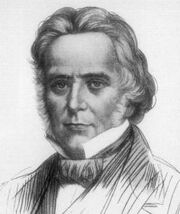
Lord Thomas Macaulay.
In the early years of British colonialism in the East, the British government enacted several Indian Charter Acts which gave the East India Company exclusive rights of trade and commerce in India and subsequently, also the right to rule its largest colony. Amongst these was the Charter Act of 1833 which introduced legislative centralisation in India and extended the tenure of the commercial grant of the company for another 20 years. The Charter Act of 1833 required the appointment of a Law Commission to consolidate, codify and improve the “splintered (legal) systems prevailing in the Indian Subcontinent”. Lord Thomas Macaulay was appointed president of that commission in 1835. He drafted the Indian Penal Code with the help of many experienced lawyers to replace Hindu criminal law. The latter was based on the Manusmriti, generally known in English as the Laws of Manu or "Dharmic discourse to Vedic rishis" on the "way of living" for various classes of society, and which had hitherto held sway in the greater part of India.
Macaulay’s first draft of the Penal Code contained a Clause 361, which prescribed a severe punishment for touching another with the purpose of satisfying unnatural lust. Macaulay abhorred the idea of any discussion or debate on this "heinous crime" and in the Introductory Report to the proposed draft Bill dated 1837 stated:
"Clause 361 and 362 relate to an odious class of offences respecting which it is desirable that as little as possible should be said...[we] are unwilling to insert, either in the text or in the notes, anything which could give rise to public discussion on this revolting subject; as we are decidedly of opinion that the injury which would be done to the morals of the community by such discussion would far more than compensate for any benefits which might be derived from legislative measures framed with the greatest precision."
The lack of any debate, suggesting the creation of this definition purely at the discretion of Macaulay, also explains the sheer vagueness and ineffectiveness of the language of the proposed anti-sodomy section. The concept of an "unnatural touch" was too woolly to be an efficacious penal statute, and the final version proved to be a substantial improvement on the initial draft. Macaulay's final copy included a Section 377, a statute based on English criminal law which sought to prohibit "buggery" or sodomy, largely taken to mean anal sex between men. The Indian Penal Code was finally incorporated by the British colonial administration in the late 1850s.
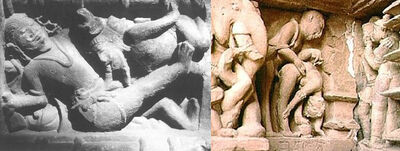
Hindu temple sculptures in Khajuraho depicting homosexual sex. (See also Hinduism and LGBT topics)
Under Hindu law, consensual sex between adult males was never an offence. The classic Indian text, Kama Sutra, dealt without ambiguity or hypocrisy with all aspects of sexual life including marriage, adultery, prostitution, group sex, sadomasochism, male and female homosexuality, and transvestism. In the new Indian Penal Code, however, Section 377 criminalised "carnal intercourse against the order of nature". The latter phrase was a new legal concoction, not previously found in British law. It was derived from words attributed to, amongst others, Thomas Aquinas and Sir William Blackstone. A fine and/or up to 10 years' imprisonment were specified for these activities. It is ironic that Lord Macaulay never lived to see his infamous unnatural sex law, which was to wreak so much misery on the lives of homosexual men throughout Britain's colonies for well over a century, come into force in India. Also, despite his apparent revulsion for homosexuality, Macaulay himself never married and his closest companion was his sister Hannah.[6] (For a detailed history of Macaulay's enactment of India's Section 377, see archive of the academic paper, "Section 377 and the dignity of Indian homosexuals" by Alok Gupta).
Colonial diffusion
Section 377 became effective as part of the British-imposed Indian Penal Code from 1 January 1862, and was adopted by the colonial masters, also as "Section 377" into the Straits Settlements Penal Code in 1871. The cloned and transplanted law came into operation in the Straits Settlements of Singapore, Penang and Malacca on 16 September 1872.
Similarly worded legislation, also under the same numbered section of each country's penal code, that is, "377", as if it were a trademark, was introduced by the British into their other Asian colonies such as India, Pakistan, Hong Kong, Malaya (now Malaysia), Brunei and Burma (now Myanmar) in the late 19th century.
Sri Lanka, the Seychelles and Papua New Guinea have the key wording from India's Section 377, but different article numbers. Parallel wording appears in the criminal laws of many former British colonies in Africa.[7]
Section 377A (Outrages on decency) was added to the sub-title "Unnatural offences" in the Straits Settlements Penal Code in 1938. Both Sections were absorbed unchanged into the Singapore Penal Code when the latter was passed by Singapore's Legislative Council on 28 January 1955.
Scope
The original Section 377 (repealed in October 2007)
Unnatural sex or sodomy was not defined in the Indian Penal Code drafted by the British. Legal records show that Indian legislators in the 19th and early 20th centuries interpreted "carnal intercourse against the order of nature" between individuals (of all sexes - the law being non-gender specific with its use of the word "whoever") to include anal sex, bestiality and, often after much courtroom deliberation, oral sex as well; namely, any form of sexual intercourse which did not have the potential for procreation.
Therefore, both heterosexual and homosexual oral and anal sex were criminal offences under the same law. In this respect, Section 377 did not discriminate against homosexuals. The latest eminent example of this was demonstrated on Tuesday, 27 August 2019 when an ex-primary school vice-principal was charged and found guilty under the former Section 377 because the offences were committed before the statute was repealed in 2007. The vice-principal had sexually groomed a student for years from when he was 14, eventually taking him into his own home, and performing occasional oral sex on him[8].
However, early cases tried under Section 377 in India mainly involved forced fellatio with unwilling male children, and one unusual case in 1934, Khandu vs. Emperor, of sexual intercourse with the nostril of a water buffalo (see Khandu vs Emperor, AIR, Lahore, 1934,[9],[10]).
Theoretically, even lesbian sex which involved penetration, eg. of a finger, tongue or sex toy into the vagina or anus, would be covered under the law, although there are no records of any judge in India or Britain's numerous other colonies interpreting the law to include sex between women.
In the Singaporean context, recent cases had established that heterosexual fellatio was exempted if indulged in as foreplay which eventually led to coitus. The Singaporean margin note of the original Section 377 further explained that mere penetration of the penis into the anus or mouth even without orgasm would constitute the offence. The law applied regardless of the act being consensual between both parties and done in private.
Owing to overwhelming public support after the 2003 Annis Abdullah case in which a policeman was convicted under Section 377 and sentenced to 2 years' jail for having consensual oral sex with a 16-year-old girl, and the realisation by the politico-legal system that the statute was no longer relevant to contemporary society, Section 377 was repealed in October 2007 during the extensive review of the Singapore Penal Code. A new Section 377, which criminalised sex with dead bodies ("Sexual penetration of a corpse")[11], was substituted in its place.
Enactment of Section 377A
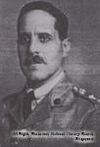
Inspector-General René Onraet reported in 1937 that "male prostitution" was widespread in Singapore.
In 1937, René Onraet, the then Inspector-General of the Straits Settlements Police Force, submitted his annual report to Singapore's colonial government on the state of crime on the island, noting that with regard to vice, "male prostitution" was widespread. Historical correspondence provides evidence that the document caused the government to institute "a policy…to stamp out this evil" and was a prelude to making such acts between men a criminal offence so that male prostitution could be policed[12],[13]. However, it must be stressed that "male prostitution" was not solely targeted but all forms of sex work and pimping which the authorities regarded as "social evils".
One year after Inspector-General Onraet's report, Section 377A was introduced in 1938 by the Legislative Council into the Straits Settlements Penal Code to criminalise all non-penetrative sexual acts between men, eg. mutual masturbation and frottage. Onraet's follow-up progress dossier entitled, "Annual report on the organisation and administration of the Straits Settlements police and on the state of crime for the year 1938" (page 414, paragraph 48), published in 1939, announced that "male prostitution and other forms of beastliness were stamped out as and when opportunity occurred." The news was also carried in a Straits Times article dated 21 July 1939, on page 14[14]. Examining historical correspondence of the colonial government, it is apparent that 377A was enacted to enable male prostitution to be surveilled and also perhaps to protect European expatriates and visitors from the vice. It was not meant to prosecute adult males who indulged in consensual sex in private. This inference is in line with the fact that one of the first reported offences under Section 377A involved a British captain, Douglas Marr, who was charged for but acquitted of illegal homosexual acts with a Singaporean Malay male youth, Sudin bin Daud, at the captain's home in 1941[15],[16],[17] (also see below).
Between 2014 and 2016, further relevant documents from the United Kingdom’s National Archives were declassified which provided additional evidence that Section 377A was meant to target commercial sex rather than to criminalise consensual gay sex between men. A 1940 report which was declassified in 2016 showed that the enactment of Section 377A was in response to an “outbreak” of male prostitution in Malaya at the beginning of 1938. The report was addressed to George Gater, who held the title of Permanent Under-Secretary of State for the Colonies and made it apparent that there was a relationship between the two events. The report detailed two cases in 1938, the year the law was enacted. The first, which took place three months before Section 377A came into effect, involved a colonial official named Reeves who was suspected of having relations with male prostitutes but was not charged initially as there was no proof. The second case involved another official, Rivaz, who was sacked as the charges, similar to those made against Reeves, were justified following the enactment of Section 377A. Another incident, described in a document dated 24 March 1938 which was declassified in 2014, was one in which a European warder of the Straits Settlements Prisons, Moses, resigned after being caught in January 1938 attempting to sodomise two male prostitutes. This document was a communication from Sir Thomas Shenton, governor and high commissioner of the Straits Settlements, to the secretary of state for the colonies. There was evidently a problem within the civil service of civil servants patronising male prostitutes and it was this that gave rise to the law.
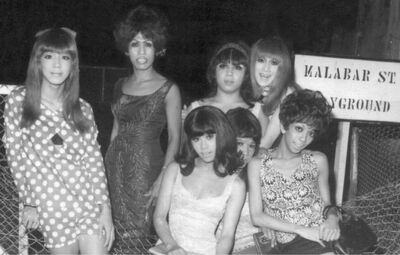
Transwoman sex workers, often mistakenly referred to as "male prostitutes", or even as "catamites" by the authorities, posing near the Bugis Street area in the 1960s.
"Male prostitution" during that era most likely referred to sex work by male-to-female cross-dressers or transvestites, a phenomenon which was rampant. Prostitution by non cross-dressing, outwardly male sex workers, known contemporarily as "rent boys" and, more recently, as "money boys" after the recent mainland Chinese influx, was almost unheard of then.
One possible reason why the British sought to enact Section 377A, even though they already had and could use the non-gender specific Section 377 to charge transwoman prostitutes and their clients was that the police must have found it difficult to use Section 377 to prosecute cross-dressers, who were legally men, for having sex with their male clients if prima facie evidence of anal or oral sex could not be produced. In these cases, a new law such as Section 377A which was vague enough to convict any form of non-penetrative sexual activity between men, or more accurately, a cross-dressing man and his outwardly male partner, could be used as a backup. The fact that two "men" were seen fondling each other or perhaps merely found naked together in a brothel room would be sufficient for a charge to be made against them. This was exactly how the Labouchere Amendment from which Section 377A is derived (see below) was used in the UK from the late 19th century onwards.
It is highly unlikely that in the 1930s, Section 377A was introduced to curb consensual sex in private between men who were both outwardly male in appearance as these activities had a much lower profile, were largely invisible to the public eye and were non-commercial in nature. However, in future decades, especially beginning in the latter half of the 1980s after the arrival of HIV/AIDS in Singapore, the existence of the law enabled the police to harass homosexuals who cruised in public places and to charge them if they had sex. The law has since been used mainly for this purpose, even though it was not the initial intention of the British colonial legislators.
Early prosecutions
Between 1938 and 1941, seven high-profile cases of prosecution under or related to Section 377A happened. Although four cases involved Europeans, only one was convicted.
In September 1938, Lim Eng Kooi and Lim Eng Kok became the first to receive punishment in the Straits Settlements. The two "well-known" Penang Chinese were sentenced to seven months imprisonment each under Section 377A[18].
In March 1941, a Tan Ah Yiow was sentenced to nine months imprisonment after he was found with a "European client" in a "low down quarter", where he was discovered by F. J. C. Wilson, head of the local Anti-Vice Branch, following a tip. Wilson added that in court that a "disgusting and revolting practice had been performed", with medical evidence forthcoming[19].
In April 1941, Lee Hock Chee was prosecuted under Section 377A after a lascar saw him molesting a sleeping Chinese boy at a five-foot passageway off Rochore Road[20].
In April 1941, Captain Douglas Marr, the Deputy Assistant Provost Marshal of the Singapore Fortress Command, was accused of having committed "an act of gross indecency" with a male Malay youth, Sudin bin Daud, who denied being a "catamite". Sudin claimed that on March 13 or 14, he was walking along Stamford Road, a supposed "area for male prostitutes", at night when a car driven by Marr stopped, picked him up and brought him to his boarding house in Tanglin Hill. The offence against Section 377A allegedly took place there, he claimed, whereupon Marr gave Sudin some money and let Sudin take a watch before Sudin left, leaving his shirt there. In his defence, Marr claimed that he had wanted to get "at the root of the homosexual type of vice and I thought, as it transpires very foolishly, that it would be a good idea to question a catamite and to try and find out to what extent soldiers in different regiments were involved". Marr did not deny picking up Sudin, who he claimed approached him, but maintained that he merely questioned him back home to no avail, as he had mistaken Sudin for an Indian and spoken to him in Hindustani. On 16 April and 29 July, after a withdrawn appeal by the prosecution, Marr was acquitted of the charge, despite the fact that Sudin's shirt was found in his room[21],[22],[23],[24],[25]. Sudin, who had pleaded guilty to the act of gross indecency and theft of the watch, was sentenced to eighteen months imprisonment on 27 March[26].
In May 1941, Gunner Ernest Allen of the Royal Artillery became the only European convicted under Section 377A after witness Chan Yau testified that in March, he and Allen had committed the alleged offense in an Anguilla Road house. Allen denied the allegations, claiming that he had hired Chan to get him a girl. Allen was sentenced to 15 months imprisonment[27],[28].
In July 1941, a case involving Mr. Griffith-Jones who admitted "he had been addicted to homosexual practices" and two Chinese locals, Tan Ah Lek and Lim John Chye, who extorted and attempted to extort money from him by threatening to expose him, went to court. The European, who "held a responsible position in a Singapore firm", first came into contact with Lim in January 1939, when Lim wrote a letter to him asking for $5 to keep silent. By 1940, Griffith-Jones had paid him over $1,000, while the English-speaking Tan had extorted and tried to extort a total of thousands of dollars from Griffith-Jones from the end of 1938, even extracting monthly payments from him. On 30 July, he was sentenced to five years imprisonment[29],[30],[31].
Labouchere Amendment
The term "gross indecency" used in Section 377A was based on the wording of the Labouchere Amendment, also known as Section 11 of the Criminal Law Amendment Act 1885 of the UK. It was not a euphemism for buggery or sodomy, which was already a crime but rather, any other sexual activity between men.
Wording
It was worded thus:
"Any male person who, in public or private, commits, or is a party to the commission of, or procures, or attempts to procure the commission by any male person of, any act of gross indecency shall be guilty of a misdemeanour, and being convicted shall be liable at the discretion of the Court to be imprisoned for any term not exceeding two years, with or without hard labour."
The almost identical phrasing between the Labouchere Amendment and Section 377A is the best evidence that the latter was derived from the former.
Reason for enactment
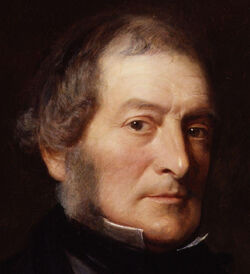
Henry Labouchère.
In the 1880s, Britain was in the grip of a moral panic about the extent of prostitution. At the time, it was legal to have sex with teenage girls as young as 13 years of age, while a thriving trade buying and selling girls for prostitution alarmed many middle-class citizens. The Criminal Law Amendment Bill was thus drafted in 1881 to combat this. However, it languished for four years until a new scandal in July 1885 - a newspaper undertaking investigative journalism managed to buy a girl - roused parliament into renewed action.
On 6 August 1885, a member of parliament, Henry Labouchère, proposed a last-minute amendment to the bill making “gross indecency” between males an offence. There was hardly any debate although one member of parliament, Charles Warton, questioned whether Labouchère's amendment had anything to do with the original intent of the bill, namely, the prohibition of sexual assault against young women, and prostitution. Speaker Arthur Peel responded that under procedural rules any amendment was permitted as long as Parliament permitted it.
Without a record of a debate, it is difficult to know what the UK Parliament’s intention was with respect to the “gross indecency” clause. But if one considers that the Amendment Bill as a whole was designed to address prostitution and human trafficking, and if one realises that not only was female prostitution rife, but so was male prostitution, one can more or less guess why. The main part of the Criminal Law Amendment Act was gender-specific about girls as victims. Without the Labouchere Amendment, it would not have addressed male prostitution at all.
Punishment
The former Attorney-General, Sir Henry James, while supporting the amendment, objected to the leniency of the sentence, and wanted to increase the penalty to two years' hard labour. Labouchère agreed, and the proposed amendment was tacked onto the full Criminal Law Amendment Bill. The latter was rushed through and passed as the Criminal Law Amendment Act in the early hours of 7 August 1885.
Vagueness
As a result of the vagueness of the term "gross indecency," this law allowed juries, judges and lawyers to prosecute virtually any male homosexual behaviour where actual sodomy could not be proven. The sentence was relatively light compared to sodomy, which remained a separate crime.
Prosecutions
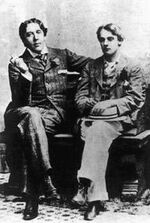
Oscar Wilde and his lover, Lord Alfred Douglas.

Alan Turing, Great Britain's mathematical genius who was sentenced to chemical castration under the Labouchere Amendment.
Lawyers dubbed the Labouchere Amendment or Section 11 of the Criminal Law Amendment Act 1885, the "Blackmailer's Charter". It was ceremoniously invoked for the first time to convict the celebrated author Oscar Wilde ten years later, in 1895. Wilde was given the most severe sentence possible under the act, which the judge described as "totally inadequate for a case such as this."
The brilliant mathematician, logician and cryptanalyst Alan Turing was convicted under the same law in 1952. In September 2009, UK Prime Minister Gordon Brown issued a postmortem formal apology to Turing for his “appalling” and “utterly unfair” treatment just because of his homosexuality. Turing's work led to the breaking of World War II Germany’s Enigma codes as well as developing theories which would ultimately result in the development of the modern computer. Despite his genius and contributions, he was charged for a felony and lost his security clearance and his job. He was sentenced to chemical castration with female hormones in lieu of a prison sentence. Two years later, he committed suicide by poisoning himself with cyanide[32].
Repeal
The law was repealed in part by the Sexual Offences Act 1967 when homosexual acts were decriminalised in England and Wales, with remaining provisions being deleted later.
Singapore's Section 377A
Singapore's Section 377A is descended from the Labouchere Amendment[33]. There is no compelling evidence to support the legend that lesbians were not included in similar legislation all across the Commonwealth because Queen Victoria refused to believe that they were capable of such behaviour.
In the local context, "gross indecency" is a broad term which, from a review of past cases locally, has been applied to mutual masturbation, genital contact, or even lewd behaviour without direct physical contact. As with the former Section 377, performing such acts in private does not constitute a defence. There has never existed any law in Singapore equally specific to non-penetrative lesbian sex. Although Section 377A has been in the statute books since the 1930s and was retained even after the Penal Code review of October 2007, it is only sporadically enforced. At the conclusion of the debate on the Parliamentary petition to repeal Section 377A in 2007, Prime Minister Lee Hsien Loong promised that his government would not "proactively enforce" the statute.
However, its presence is used to justify much of the discrimination faced by gay men in Singapore. Some examples are the prohibition by the Ministries of Education and Defence of teachers and higher-ranking military personnel from coming out, and curtailment of employment opportunities and promotion in these sectors. It also influences censorship guidelines by the Media Development Authority which prevents positive portrayals of LGBT people in films and the broadcast media and public advertisements targeting the LGBT community (see main article: Singapore gay censorship).
After the erstwhile Section 377 was replaced by the current law criminalising sex with corpses, it has become a standing joke in the LGBT community that in the Penal Code, gay sex (377A) is now sandwiched between sex with dead bodies (the new Section 377) and sex with animals (Section 377B, "Sexual penetration with a living animal").[34]
Lee Kuan Yew's statement about not prosecuting consensual gay sex, 2000

Interview-based US radio show producer Terry Gross.
On 24 October 2000, Senior Minister Lee Kuan Yew was interviewed by female news anchor Terry Gross of the US' National Public Radio:
Gross: ...I want to just get back to something we were talking about earlier, which is certain things that are illegal in Singapore. What are the laws against homosexuality in Singapore?
LKY: Well, we are with British 19th centuries law on homosexuality which is on the statute book. But we have not prosecuted anybody for homosexuality for the last 40, 50 years. What is on the statute book, and if you molest somebody and try and make him a homosexual, particularly if he's a minor, then the law will be enforced. It's a question of judgement. Once we conclude that homosexuality is also a DNA problem, then you've got to approach the punishment in a different way. And if you have consenting adults, well, God bless both of them. But let's...
Gross: God bless both of them only if you find DNA evidence, or...
LKY: No, no. Only if they do not inveigle and draw in innocent, young boys who are not with that inclination.
Contradictory events on the ground
In refutation of Lee's pronouncements about not prosecuting consenting adults for homosexual sex, on 23 July 2001, two undercover policemen infiltrated gay sauna Club One-Seven and arrested two men for having consensual oral sex in a locked cubicle (see main article: Police raids at Club One-Seven). They were originally charged under Section 377A which carried a maximum punishment of 2 years in prison.
Only after their defence counsels fought against this, perhaps by pointing out Lee's statements, was the charge amended to one under Section 20 of the Miscellaneous Offences (Public Order and Nuisance) Act for which the maximum punishment was much less severe - a fine not exceeding $1,000 or a jail term not exceeding one month for an initial offence. The 2 men were eventually fined $600 each. This was probably a landmark ruling which set an important legal precedent.
This case eminently demonstrated that verbal assurances from the Government were no guarantee that the police and the courts would not continue to use Section 377A and that it was perfectly legal for them to do so since the law still remained on the statute books. It was only when the accused's lawyers reminded the judges of politicians' oral statements that the charge was amended to a lesser one. Should the defence lawyers themselves have been unaware that such a promise was made and if no publicity was given to the case, the defendants may very well have been charged under the archaic law.
Annis Abdullah case
- Main article: Annis Abdullah case
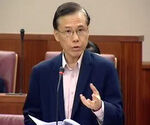
Minister of State for Home Affairs in 2004, Ho Peng Kee.
The movement to repeal Singapore's original Section 377 was galvanised by the Annis Abdullah case. In November 2003, police constable Annis Abdullah was found guilty of oral sex with a 16-year-old girl and sentenced to 2 years' jail. Although it was consensual, he was charged under the former Section 377[35]. Many letters were written to the press, shocked that in this day and age, consensual oral sex was still a criminal offence.
In response to the public outcry, the Ministry of Home Affairs said that they were reviewing this aspect of the law. In January 2004, the Minister of State for Home Affairs, Ho Peng Kee reiterated in Parliament that the decriminalisation of oral sex was under review, but only for heterosexuals.
Penal Code review
In 2006, the Ministry of Home Affairs announced that it would be carrying out an extensive review of the entire Singapore Penal Code, the first in 22 years. The exercise took over a year and gathered extensive feedback from the public via the press, the Internet and live forums.
Repeal or retain Section 377A?
The most heated debate concerning the major review of the Singapore Penal Code was not over which laws were to be repealed or amended, but over the statute which would be retained, i.e., Section 377A, the anti-gay law.
185 convictions under 377A from 1997 to 2006
In May 2007, Nominated MP Siew Kum Hong queried the Minister for Home Affairs in Parliament about the number of men prosecuted and convicted under Section 377A over the past decade:
Siew Kum Hong: To ask the Deputy Prime Minister and Minister for Home Affairs, in each of the last ten years, (a) how many prosecutions and convictions have there been under section 377A of the Penal Code; (b) how many of these prosecutions were police prosecutions; and (c) how many of these police prosecutions were the result of proactive police enforcement.
Wong Kan Seng: The statistics on the number of persons convicted under section 377A (Outrages on decency) of the Penal Code, between 1997 and 2006 is shown below. Prosecution statistics are not available. Police does not proactively enforce the provision.
| 1997 | 1998 | 1999 | 2000 | 2001 | 2002 | 2003 | 2004 | 2005 | 2006 |
|---|---|---|---|---|---|---|---|---|---|
| 25 | 16 | 31 | 30 | 23 | 25 | 11 | 13 | 4 | 7 |
Arguments raised
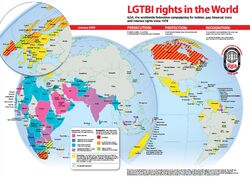
Map of the world showing the status of LGBT rights in each country.
Advocates of the repeal often cited reasons of civil liberty, human rights, and increasing scientific evidence that homosexuality was inborn[36] and found in nature[37].
Britain, the former British colony of Hong Kong, and Australia have since repealed laws prohibiting sex between men in 1967, 1991 and 1997 (in the state of Tasmania, the last Australian state to do so) respectively. India effectively repealed her Section 377, by having it "read down" initially in 2009 (see video) and finally in 2018. Fiji was the first Pacific island nation to repeal her version of Section 377 in 2010[38],[39]. Elsewhere in East and Southeast Asia, apart from Singapore, only Myanmar, Malaysia and Brunei, all former British colonies, and recently Indonesia's Aceh province (applicable only to Muslims), continue to criminalise sex between men.[40]
Opponents of the repeal based their arguments on the conviction that to decriminalise homosexuality would result in a breakdown of the family unit, compromise Singapore's position on procreation, and lead to future undesirable scenarios such as the approval of bestiality and paedophilia.
They also emphasised the wishes of the putative conservative majority to retain 377A. This was despite there being no formal survey or census done specifically on the topic. In various Singaporean online forums, such as Reach, and the AsiaOne Forum, strong opinions such as homosexuality being a genetic disease, the existence of a militant gay agenda originating from the West, homosexuality being a product of Western decadence incompatible with Singapore, were repeatedly posted. Conversion treatments, such as those by NARTH, were also recommended.
Forums organised
In the lead-up to the overhaul of the Penal Code, forums were organised to discuss the issue of homosexuality in Singapore and the repeal of Section 377A.
A seminar entitled, "Christian Perspectives on Homosexuality and Pastoral Care" was organised by Safehaven, a ministry of the Free Community Church. It was held at the Amara Hotel on 10 May 2007.

PAP MP Baey Yam Keng and NMP Siew Kum Hong look at gay activist Alex Au as he makes a point during the Section 377A repeal forum organised by W!ld Rice.
During the dialogue, Dr Tan Kim Huat, who was the Chen Su Lan Professor of New Testament and Dean of Studies at Trinity Theological College said, "Singapore is a pluralistic society...There must be spaces for it", referring to homosexuals in society. This was the reason he gave for supporting the repeal of Section 377A (see video:[41];[42]).
Another forum to discuss the repeal of Section 377A was organised on Sunday, 15 Jul 07 by theatre company W!ld Rice in conjunction with Happy Endings: Asian Boys Vol 3, a gay play that was then being staged. The forum, held at the National Library, attracted some 250 people.
For the first time in the history of forums on gay issues in Singapore, a member of parliament from the ruling People's Action Party, Baey Yam Keng, and a Nominated Member of Parliament, Siew Kum Hong, were part of the 5-member panel convened to debate the issue.
Baey publicly voiced his support for the law to be repealed, saying, "Personally, I think that the whip should be lifted for a very open debate and open expression of opinion by the MPs. And if that is so, I would vote for a repeal of the act."[43]
The Ministry of Home Affairs (MHA) was quoted in The Straits Times of 18 September 2007 saying that public feedback on the issue had been "emotional, divided and strongly expressed", with a majority of people calling for Section 377A to be retained.[44] The MHA also said that it recognised that "we are generally a conservative society and that we should let the situation evolve".
Video appeals and online campaigns
The prospect for the repeal of both Sections 377 and 377A in Singapore captured the attention of gay activists worldwide. In August 2007, on a visit to Singapore, award-winning movie star and thespian Sir Ian McKellen made an appeal to the authorities to get rid of this remnant of British colonial law, just as his country of origin had done[45]:
On 3 October 2007, another online appeal was launched via the website Repeal377A.com to gather signatories for an open letter to the Prime Minister calling for the repeal of Section 377A. In response, a counter-petition on the website Keep377A.com was set up by entrepreneur Martin Tan to give citizens a channel to voice support for the Government's retention of the law. By 1:30 p.m. on 20 October, Keep377A had overtaken Repeal377A by 7,068 to 7,058 signatories in just two days of its launch.[46] (The content of the Keep377A.com website was removed in 2009, although its web address remains. This may be evidence that the resolve of the Keep377A camp was weaker than that of the proponents of repeal, despite claims of the former to have garnered more support in the form of signatures.)
On 12 October 2007, in an initiative headed by impresario Alan Seah, leading members of Singapore's arts fraternity, both gay and straight, took part on a promotional rap video titled Repeal 377A Singapore!. It was produced and directed by Edgar Tang and theatre celebrity Pam Oei[47]:
Concerned with what was perceived as the video's narrow presentation of issues, a "Families Petition"[48] was launched by an independent focus group FamilyOverFreedom to run until 9 August 2015 as an awareness campaign aimed at educating the middle ground of undecided voters on the potential long-term impact of a repeal on the institution of the family.
Open letter to the Prime Minister
- Main article: Open Letter to the Prime Minister to repeal Section 377A
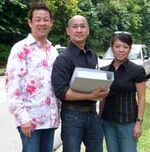
Presenters of the Open Letter to the Prime Minister - Ivan Heng, Alan Seah and Pam Oei.
On Friday, 5 October 2007, an Open Letter urging the abolition of Section 377A was organised online [49].
The 400-page letter which was supported by 8120 signatories was hand-delivered to the Prime Minister's Office at The Istana on Monday, 8 October 2007 at 2:30pm by co-organiser Alan Seah, theatre director and actor Ivan Heng and actress Pam Oei.
Credibility of Keep377A.com and Repeal377A.com
As online petitions, both websites suffered the same doubts regarding the credibility of the numbers of their signatories. There was no mention of whether technical measures were taken to ensure that multiple-voting by the same person was prevented.
In addition, the opening page of Keep377A.com was amended to include the following conclusion:
"Take time to hear from friends who are gay so that we too can understand their point of views personally. In our democracy, we can learn to agree to disagree, peacefully and respectfully."
The statement was incongruous with forum postings in other parts of the site which repeatedly used derogatory terms and called for Section 377A to be actively enforced.
Research cited by Keep377A.com
One of the references cited within Keep377A.com was a 2005 research article titled "Singaporeans’ Attitudes toward Lesbians and Gay Men and their Tolerance of Media Portrayals of Homosexuality",[50] written by Benjamin H. Detenber and Mark Cenite of the Wee Kim Wee School of Communication and Information, Nanyang Technological University. The article reported findings on the attitudes of Singaporeans towards homosexuals, with an emphasis on the comfort of viewing homosexual acts in the mass media. The conclusion highlighted a significant level of negativity. It was not, however, mentioned in the article whether this negativity translated into a specific desire to criminalise homosexual acts. The objectives of the research also did not involve gauging attitudes relating to legislation. A follow-up study by Detenber in 2010 revealed a softening of attitudes towards homosexuality:[51].
Copycat sites
Towards the end of October 2007, at least one copycat site emerged - Support377A.com. Created in virtually the same format as its predecessors, it nevertheless only featured letters to forums against the repeal, and supposed church sermons given on the subject by the Cornerstone Community Church and the Church Of Our Saviour.
Parliamentary petition to repeal Section 377A
- Main article: Parliamentary petition to repeal Section 377A

Organisers of the parliamentary petition to repeal Section 377A - George Hwang, Tan Joo Hymn and Dr Stuart Koe.
In the second weekend of October 2007, a parliamentary petition to repeal Section 377A was organised by human rights lawyer George Hwang, CEO of LGBT web portal Fridae.com Dr Stuart Koe and housewife Tan Joo Hymn [52]. It was revealed during a press conference that it had garnered 2,519 signatures from Singaporeans and Singapore residents (see video:[53]).
The parliamentary petition was a democratic instrument that had lain dormant until resurrected by its organisers. The last time such a petition was presented to Parliament was over 20 years ago. The current one was endorsed by the Clerk of Parliament and scheduled to be presented by NMP Siew Kum Hong on Monday, 22 Oct 07.
Parliamentary debate
On Monday, 22 October 2007, Nominated Member of Parliament Siew Kum Hong tabled a petition to the Parliament of the Republic of Singapore in support of the repeal of Section 377A (see videos:[54],[55],[56],[57],[58]). A petition is required to pass through the scrutiny of the Public Petitions Committee in order for the issue to be fully debated in Parliament. The debate which ensued regarding the petition was the most heated in recent Parliamentary history.
The most impassioned opposition to the petition was provided by fellow NMP Thio Li-ann, imploring the government to retain Section 377A (see videos:[59],[60],[61],[62]).
There were Members of Parliament, however, who spoke up in support of repealing Section 377A or to highlight its legal and moral inconsistencies. They were PAP MPs Charles Chong (see video:[63],[64]), Baey Yam Keng (see videos:[65],[66],[67] ) and Hri Kumar Nair (see videos:[68], [69],transcript of speech). (For a complete list of MPs who spoke regarding Section 377A, see: [70])

PAP MPs who spoke up in favour of repealing Section 377A - Baey Yam Keng, Charles Chong and Hri Kumar Nair.
Other PAP backbenchers, while endorsing the retention of Section 377A, did offer words of support for the gay community (see video).
Ms. Indranee Rajah, a PAP Member of Parliament and former chairperson of the Government Parliamentary Committee for Law and Home Affairs, reiterated the Ministry of Home Affairs' "assurance" that it would not actively prosecute people under that Section. "But in recognition of the fact that there is still quite a strong majority uncomfortable with homosexuality, the Section must stay," she said. However, she suggested that Singaporean society could evolve to accept homosexuality in the future (see video:[71]).
Disappointingly, opposition MP and Workers' Party chairperson Sylvia Lim did not take a stand regarding the repeal of Section 377A (see video:[72]). She proposed the setting up of a Select Committee to scrutinise the wording and execution of the Penal Code and to comprehensively archive and make publicly available feedback from all civic groups.
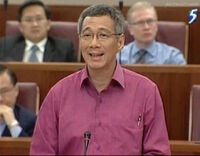
Prime Minister Lee Hsien Loong makes his concluding speech on the debate over the repeal of Section 377A.
In his concluding speech, Prime Minister Lee Hsien Loong highlighted the point that Singapore was "basically a conservative society" with many being "uncomfortable with homosexuals, more so with public display of homosexual behaviour" (see videos:[73],[74],[75],[76],[77] and transcript of speech). However, as recognition that homosexuals “are often responsible, invaluable, and highly respected contributing members of society”, the government would not "proactively enforce Section 377A on them."
Other important statements which the Prime Minister made, revealing Singapore's concept of human rights, were that his government did not "consider homosexuals a minority, in the sense that we consider, say, Malays and Indians as minorities, with minority rights protected under the law" and that it would not "allow or encourage activists to champion gay rights as they do in the West."
He said, "The decision on whether or not to decriminalise gay sex is a very divisive one and until there is a broader consensus on the matter, Singapore will stick to the status quo."
The eventual decision by Parliament was to retain Section 377A. (See archives of all parliamentary speeches made with regard to the Penal Code review on Monday, 22 Oct 07 and Tuesday, 23 Oct 07).
The incongruity of decriminalising oral and anal sex for heterosexuals but not for male homosexuals was highlighted in the international media[78]. It could also be argued that with the repeal of Section 377, penetrative sex between gay men was henceforth legal while non-penetrative sex remained illegal!
Repealing the non-gender specific Section 377 while retaining Section 377A, which criminalises sex specifically between men, effectively served to enshrine discrimination against MSM (men who have sex with men) in Singapore's legal system. Whether this was constitutional or not was thrashed out in the courts several years later.
Reaction of the public
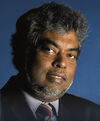
Subhas Anandan, president of the Association of Criminal Lawyers.
While conservative Singaporeans who had agitated for the retention of Section 377A were pleased, the LGBT community and more progressive factions were enraged.
Subhas Anandan, president of the Association of Criminal Lawyers in Singapore, questioned the rationale for not repealing Section 377A in a Channel NewsAsia interview:
"If you are a homosexual or a lesbian, I think you can get into trouble. We are talking about an inclusive society and being more broad-minded. Why do we want to keep these people away, out of the circle? I think we should be more broad-minded, more sympathetic and allow these people to be included in our society."[79]
Consequences of retention
The debate over whether or not to repeal Singapore's anti-gay law attracted the attention of the international media (see video), as it was perceived to be a bellwether of Singapore's human rights record.
In view of the lack of precedent of there being a law in the Penal Code retained only for symbolic reasons, not to be enforced, plus the ambiguity over what constituted "gross indecency", and the repeal of the original Section 377 criminalising carnal intercourse against the order of nature, some academic lawyers have argued that ironically, homosexual anal sex in Singapore was no longer illegal even though the apparently less abhorrent gay oral sex still was [80].
In January 2008, subsidiary legislation was implemented to amend the schedules of various criminal statutes so as to bring them in line with the recent Penal Code reforms which took effect on 1 Feb 08. One of the changes was that after the latter date, all persons convicted under Section 377A would no longer need to be registered, i.e. they would not have any criminal record for this offence [81]. At the time of writing, the legal and social implications of this were still unclear.
K Shanmugam: S'pore "not ready" to repeal 377A
On Thursday, 2 July 2009, a New Delhi high court issued a landmark ruling which overturned Section 377 of the Indian Penal Code, a 150-year-old British colonial law criminalising penetrative homosexual sex (see video:[82]). 3 days later, on Sunday, 5 July 2009, Law Minister K Shanmugam was asked by female grassroots leader Khartini Abdul Khalid during a dialogue session at Punggol Central Division whether it was time for Singapore, whose laws were "copied" from India by the British, to repeal Section 377A. Shanmugam replied "no" because Singapore society was "not ready" for it[83].
Singapore's human rights report card
- Main article: Universal Periodic Review: Singapore LGBT issues
On 31 October 2010, at least 8 civil society groups, including the LGBT one, People Like Us (PLU), submitted their views on Singapore's human rights track record to the United Nations ahead of the 1 November 2010 deadline. The move was part of the Universal Periodic Review of all UN member states and was the first time that Singapore's human rights record came under scrutiny by the UN. The discrimination against homosexuals under Section 377A was one of the issues highlighted (see video).
Section 377A actively enforced again
In an apparent reneging of Prime Minister Lee Hsien Loong's word and the government's promise never to apply Section 377A again, the police employed a decoy to entrap an ethnic Indian Malaysian man allegedly cruising for gay sex around the disused cemetary at Jalan Kubor in 2010. This episode of the police entrapment of gay men occurred after almost a decade of cessation of the operations.
Section 377A was again used to charge two men having for having oral sex in a toilet cubicle at Mustafa Centre. The gay community was indignant because the non-gay discriminatory Section 294(a), which criminalises "any obscene act in any public place" irrespective of gender (see below) could have easily been used instead.
Constitutional challenge
- Main article: Section 377A constitutional challenge
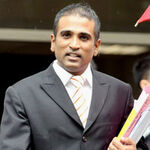
Well known human rights and criminal lawyer, M Ravi.
On Friday, 24 September 2010, well known criminal and human rights lawyer M Ravi filed an application in the High Court to challenge the constitutionality of Section 377A on behalf of his client Tan Eng Hong, who was charged for allegedly having oral sex with another consenting adult male, Chin, in a locked cubicle of a public toilet[84],[85]. Ravi's main argument was that Section 377A was fundamentally a provision of the law that fell into the category of laws that expressed human prejudices. A considerable amount of background research regarding the case was done by then NUS law undergraduate Indulekshmi Rajeswari.
Tan was originally charged under Section 377A but to avoid the inconvenience of a constitutional challenge which would set a precedent and open the floodgates to other constitutional challenges, the Attorney-General’s Chambers (AGC) withdrew the 377A charges in mid-October 2010 and substituted charges under Section 294(a) instead.
Section 294(a) of the Penal Code[86] states:
"Whoever, to the annoyance of others does any obscene act in any public place...shall be punished with imprisonment for a term which may extend to 3 months, or with fine, or with both"

High Court judge, Lai Siu Chiu.
Section 294(a), in contradistinction to Section 377A, does not discriminate against gay men as it applies to anyone who has sex in a public place, regardless of gender. Section 294(a) also carries a lighter penalty of a maximum of 3 months' imprisonment as compared to Section 377A's maximum of 2 years in jail, even for sex in a private environment.
On 10 November 2010, Chin pleaded guilty to the substituted charge of Section 294(a) and was fined S$3,000. In mid-December 2010, Tan also pleaded guilty under Section 294(a) and was likewise fined S$3,000.
During a forum on Section 377A organised by Vincent Wijeysingha and chaired by Mathia Lee on Saturday, 27 Nov 10, M Ravi and Vincent Wijeysingha both spoke regarding the forthcoming constitutional challenge (see video:[87]).
At the hearing of the constitutional challenge on Tuesday, 7 December 10, the Assistant Registrar agreed with the Attorney-General’s application to strike out the case on the grounds that the plaintiff did not have standing ("locus standi" in legal terminology) since he was no longer being charged under Section 377A but under Section 294(a) instead, and therefore the proceedings were frivolous, vexatious and an abuse of process. Tan then appealed to the High Court to reverse the Assistant Registrar’s striking-out decision.
In a judgment dated 15 March 2011, High Court judge Lai Siu Chiu dismissed the first appeal relating to the constitutional challenge against Section 377A filed by Tan Eng Hong[88]. However, she ruled that “a citizen should not have to wait until he is prosecuted before he may assert his constitutional rights” and Tan therefore did undoubtedly have "locus standi"[89], that is, he was sufficiently affected by this law to have a legitimate interest in the issue. Nevertheless, she stated that there was no "real controversy" which required the court’s attention ("real controversy" being legalese meaning that it was not a matter of importance to be decided by a court), thus reaffirming the Assistant Registrar's striking-out decision (see full text of judgment[90],[91]). Many observers regarded Justice Lai's judgment as incongruous, as how could the issue be of no "real controversy" when the law affected the lives of thousands of gay men in Singapore?
M Ravi's appeal against Justice Lai's "no real controversy" ruling took place on Tuesday, 27 September 2011[92],[93],[94],[95]. Owing to widespread publicity by Roy Tan in the LGBT community[96],[97], the court's gallery, for the first time in this particular case, was packed with interested observers. These were the arguments M Ravi used to bolster his case:[98],[99].
Landmark ruling
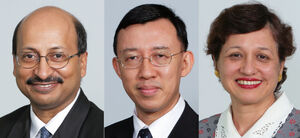
Court of Appeal judges VK Rajah, Andrew Phang and Judith Prakash.
On Tuesday, 21 August 2012, after nearly a year of deliberation, Singapore’s Court of Appeal, in a 106-page judgment, overturned High Court judge Lai Siu Chiu’s decision on 15 March 2011 when she ruled that there was no "real controversy" which required the court’s attention [100],[101],[102],[103],[104].
The 3 presiding Judges of Appeal, Justices VK Rajah, Andrew Phang and Judith Prakash, found an arguable case on the constitutionality of Section 377A that ought to be heard in the High Court. They explained that Tan was at the outset arrested, investigated, detained and charged exclusively under Section 377A. This, they said, squarely raised the issue as to whether Tan's initial detention and prosecution were in accordance with the law. Secondly, there was a real and credible threat of prosecution under Section 377A.
They said Tan would be allowed to vindicate his rights before the courts based on a finding that there was an arguable violation of his constitutional rights. The judges also wanted to acknowledge that Section 377A in its current form extended to private consensual sexual conduct between adult males, adding that "this provision affects the lives of a not insignificant portion of our community in a very real and intimate way. The constitutionality or otherwise of Section 377A is thus of real public interest. We also note that Section 377A has other effects beyond criminal sanctions." (See full text of judgment in main article: Archive of Court of Appeal judgment in Tan Eng Hong v AG, 21 August 2012).
Another seminal point in the ruling was that the appeal judges were "unable to agree with the AG that violations of constitutional rights only occur when a person is prosecuted under an allegedly unconstitutional law." This corollary of this was that any Singapore citizen had the standing to challenge the constitutionality of a law as long as he felt that his constitutional rights were being violated by the impugned law, even though he had not been charged under it. This groundbreaking implication was first realised and articulated by Roy Tan on the Singapore gay news list (SiGNeL)[105].
Gay couple files similar Constitutional challenge
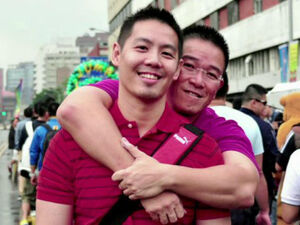
Long-term gay couple, Gary Lim and Kenneth Chee.
As soon as other stakeholders like Fridae founder, Stuart Koe, realised this, a gay couple in a 15-year relationship, Gary Lim and Kenneth Chee, were encouraged to be the new face of the Constitutional challenge, both to elicit widespread support from the LGBT community and to present a favourable image of the gay community to the general public[106]. Their lawyers were well known human rights campaigner, Choo Zheng Xi, founder of The Online Citizen, Choo's boss, seasoned lawyer, Peter Low, both of Peter Low LLC, and Indulekshmi Rajeswari, who as a law student, had helped M Ravi with the research on the challenge and who after graduation, worked for the law company Myintsoe & Selvaraj. Their case was scheduled to be heard in the High Court on 14 February 2013[107].
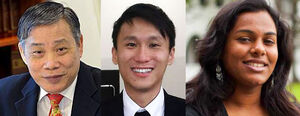
Lawyers Peter Low, Choo Zhengxi and Indulekshmi Rajeswari.
M Ravi, on behalf of his client, Tan Eng Hong, filed a separate challenge to the constitutionality of Section 377A. Tan's case was initially slated for slightly earlier, on 25 January 2013[108] but was later postponed to 6 March 2013, later than the gay couple's challenge[109].
Religious and political opposition
On 13 January 2013, Faith Community Baptist Church founding pastor Lawrence Khong told his congregation with Emeritus Senior Minister Goh Chok Tong in the audience that his church members were committed to “build strong families in Singapore” and by their definition the family unit “comprises a man as Father, a woman as Mother, and Children.”
Khong warned that they "see a looming threat to this basic building block by homosexual activists seeking to repeal Section 377A of the Penal Code."[110]
A statement later released by the church stated, “Reverend Khong used the opportunity to highlight to Mr. Goh that homosexual activists have been increasingly stepping up to challenge this framework, especially in their efforts to repeal Section 377A of the Penal Code – a move detrimental to family and family ties.”[111],[112]
Khong's actions were probably made in response to an earlier meeting in November 2012 by representatives from queer womens' group Sayoni with Minister of Law and Foreign Affairs, K Shanmugam, in which they discussed the multifarious, cascading effects of laws and censorship in Singapore[113],[114],[115],[116],[117]. The minister replied that the "majority’s social acceptance" was needed before there could be any changes in laws and policies[118]. A raging online debate ensued in the mainstream media.
A second pastor, Yang Tuck Yoong of Cornerstone Community Church, later posted a message on his website urging Christians to be “battle-ready” for “not just for this battle, but for the many battles ahead of us” against the “LGBT bloc”. However, he subsequently removed more than 100 words from his original statement after numerous complaints, both from the LGBT community and its mainstream supporters[119]. Researcher Scott Teng, aged 29, subsequently lodged a police report against Yang, saying it was "an incitement of violence"[120].
After a speech at the Singapore Perspectives conference organised by the Institute of Policy Studies on Monday, 28 January 2013, Prime Minister Lee Hsien Loong was asked by a participant, civil society activist Braema Mathi, how the fact that the republic was a secular country reconciled with “an old and archaic law that nearly discriminates against a whole (group) of people”. Lee replied, “Why is that law on the books? Because it’s always been there and I think we just leave it.”[121],[122] The LGBT community expressed their extreme disappointment with his comments.
High Court hearing
Gay couple's challenge
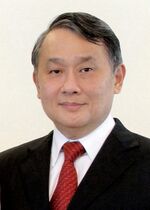
High Court judge, Quentin Loh.
On Thursday, 14 February 2013, the High Court today held the first full hearing of the constitutional challenge filed by gay couple Gary Lim and Kenneth Chee. The case was heard by Justice Quentin Loh and was conducted in chambers, meaning that only the parties who were directly involved in the matter could attend. Chee or Lim were not present for the hearing that lasted three and a half hours. Their lawyers filed a 123-page submission[123].
Arguing that section 377A was constitutional, the Attorney-General said that the law applied to all men, not just self-identified gay men, who have sex with other men; the law “reflects public morality” and "because there is a scientifically-established difference between the public health risks associated with sex between men and sex between women."
Supporting affidavits by Prof Roy Chan, founder and president of Action for AIDS, and Bryan Choong, centre manager and counsellor of Oogachaga, a gay and lesbian affirmative counseling agency in Singapore, to explain the negative effect of Section 377A on homosexual men were not allowed by the judge[124].
Tan Eng Hong's challenge
On Wednesday, 6 March 2013, Justice Quentin Loh heard lawyer M Ravi's arguments on behalf of his client Tan Eng Hong, opposed by Aedit Abdullah from the Attorney-General’s Chambers (AGC)[125].
Ravi’s case for the repeal rested on 2 articles of Singapore’s Constitution. First, Article 9(1) stated that "No person shall be deprived of his life or personal liberty save in accordance with law. “Law” here had been conclusively agreed to mean “natural justice”, not just what was in the statute books. Ravi argued that Section 377A did not meet the requirements of natural justice, since it was “inherently absurd, arbitrary [and] vague”. It was absurd and arbitrary because it persecuted people born with an immutable sexual orientation, and vague because its interpretation rested on the extremely subjective concept of “gross indecency”.
Second, Article 12(1) stated "All persons are equal before the law and entitled to the equal protection of the law." Section 377A discriminated based on sexual orientation, which had been recognised as contravening legal principles of equality in Hong Kong, India, Nepal, Fiji, the US, Portugal, Chile and Peru. The law was also discriminatory within the homosexual community because there was no convincing reason why gay male sex was criminalised while lesbian sex was legally sanctioned.
The AGC’s case, on the other hand, fundamentally rested on the principle of “public morality”, a concept explicitly referred to in the Constitution. Aedit claimed that the Singaporean public still clearly viewed gay sex as immoral, quoting Singapore’s Nanyang Technological University’s study that found that by 2010, 64.5% of Singaporeans still held negative attitudes towards homosexuals, with 25.3% expressing positive attitudes and 10.2% neutral. He further countered that comparisons of Singapore to Hong Kong, the US and India were invalid, given that their legal systems formally recognised a right to individual privacy, whereas Singapore’s did not.
Justice Loh, who did not appear to be swayed by either side, reserved judgment on the case[126].
Judgment on gay couple's challenge
On Wednesday, 10 April 2013, the High Court released Justice Quentin Loh's 92-page judgment[127].
In it, Loh said that “s 377A essentially addresses a social and public morality concern which our Legislature identified in 1938 and subsequently affirmed in 2007.” Addressing the frequently asked question which was also raised by the plaintiffs, i.e., why retain Section 377A if no one was to be prosecuted under it, Loh stated, “If there’s no prosecution of s 377A offences, that is no ground to say that s 377A is unconstitutional.”
He added, “(D)uring the October 2007 Parliamentary Debates, Parliament considered s 377 and s 377A carefully, and after debating the matter fully, endorsed the repeal of s 377 but chose to retain s 377 A. I can see no basis in this case to interfere given my reasons set out above. It is clear that Parliament saw a reasonable differentia upon which to distinguish between two classes: anal and oral sex in private between a consenting man and a consenting woman (both aged 16 and above) was acceptable, but the same conduct was repugnant and offensive when carried out between two men even if both men were consenting parties. There is therefore no reason to strike down the basis of the classification prescribed by s 377A – viz, male homosexuality – as arbitrary or discriminatory, or on the ground that it does not bear any rational relation to the purpose of the provision.”
He concluded that, “In my judgment, the object of s 377A is clear. It criminalises male homosexual conduct that is not acceptable in our society. Its retention was endorsed by Parliament in 2007… I also find that the purpose of s 377A is not a purpose which is so patently wrong as to render it an illegitimate purpose upon which to base a classification prescribed by the law."
Members of the LGBT community expressed their outrage at the ruling[128].
On 18 April 2013, the gay couple announced that they would file an appeal against the ruling. Stakeholders launched a fundraising campaign on the popular crowdfunding website, Indiegogo[129], to raise S$50,000 to help meet court costs[130]. The campaign video[131] was produced by film directors Boo Junfeng and Loo Zihan. The fundraiser proved to be the most successful in Singapore's history with the amount requested exceeded in a matter of weeks and the final figure totalling over S$100,000. This was testimony to the amount of support that the LGBT community bestowed on the couple, in contrast to the almost non-existent support offered to Tan Eng Hong.
During Pink Dot 2013, Gary Lim and Kenneth Chee were invited to be the flag bearers on the podium but no invitation was extended, nor gratitude expressed to or even mere mention made of the initiators of the constitutional challenge - Tan Eng Hong and M Ravi who clinched the successful court rulings which enabled the challenge to come thus far. This led astute observers like Lisa Li[132],[133], Nicholas Leow[134],[135] and others to comment that the LGBT community indulged in discrimination against its own members - those who were not in relationships and who did not possess the poster-friendly image that the gay couple projected[136],[137]. The discrepancy was redressed to some extent when M Ravi was invited to give a speech the following year at Pink Dot 2014 (see video:[138]).
Change in gay couple's legal team
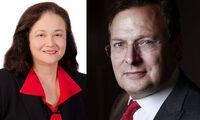
Senior Counsel Deborah Barker and Queen's Counsel Lord Peter Goldsmith.
On Tuesday, 9 July 2013, Lim and Chee issued a media statement that they had appointed Senior Counsel, Deborah Barker, who was a partner and head of Litigation & Dispute Resolution at KhattarWong LLP, one of Singapore’s leading law firms, to represent them at the Court of Appeal[139].
They had also filed for the admission of Queen's Counsel, Lord Peter Goldsmith, to argue their appeal as co-counsel with Barker. Lord Goldsmith Q.C. was Chair of Asia and European Litigation at Debevoise and Plimpton LLP, and was Attorney-General for England, Wales and Northern Ireland from 2001 to 2007 under Prime Minister Tony Blair[140],[141].
Intervention by Tan Eng Hong
On Tuesday, 13 August 2013, lawyer M Ravi, on behalf of his client Tan Eng Hong, made an application to the High Court to be recognised as an interested party and to intervene in Gary Lim and Kenneth Chee's upcoming Court of Appeal hearing as the outcome of the gay couple's appeal could affect Tan's case in which judgment was still pending [142],[143],[144],[145],[146]. This was despite the fact that it had been 2 years and 11 months since Tan's matter came before the Court.
Gay couple's Queen's Counsel application rejected
On Thursday, 19 September 2013, Court of Appeal Justice VK Rajah dismissed the gay couple's application for Queen's Counsel, Lord Peter Goldsmith, to represent them. He ruled that the application did not meet the requirement for admitting foreign senior counsel on an ad hoc basis under the Legal Profession Act, where there must be a “special reason” to do so[147],[148],[149],[150].
Judgment on Tan Eng Hong's challenge
On Wednesday, 2 October 2013, High Court Justice Quentin Loh released a 54-page judgment which stated that he "found that the statute has not infringed the rights of the plaintiff, Tan Eng Hong, and is not inconsistent with Articles 9 and 12 of the Constitution of Singapore, which ensures that one will not be deprived of his life or personal liberty save in accordance with law and that all persons are equal before the law and entitled to the equal protection of the law, respectively."[151]
While Justice Loh responded to wide-ranging arguments from decisions made by foreign courts to decriminalise male to male sex to criminalising a "natural and immutable attribute" made by M Ravi, he also said of Section 377A, "The purpose and object of Section 377A when its very first predecessor was enacted in 1938 was to respond to a prevalence of grossly indecent acts between males – whether in public or in private – which the Legislature deemed a regrettable state of affairs that was not desirable... The purpose and object of Section 377A remains the same today."
Tan Eng Hong successfully applies to consolidate both challenges
On Thursday, 10 October 2013, Judges of Appeal Andrew Phang, VK Rajah and Woo Bih Li convened on an urgent basis and ruled that the issues in both cases were essentially the same and should be heard together[152],[153],[154],[155]. M Ravi explained that his client's application to have the 2 cases consolidated was "essentially for the beneficial effect of preventing a multiplicity of actions and preventing the same questions of law and constitutional issues from being tried on separate occasions with potentially different results." He added that should judgment be issued in the gay couple's case before Tan's appeal was heard, his client "may be deprived of or have abbreviated his opportunity to vindicate his rights through access to the entire appellate process."
Court of Appeal hears 377A Constitutional challenge by Tan Eng Hong & gay couple
On 14 and 15 July 2014, Court of Appeal Justices Andrew Phang, Belinda Ang and Woo Bih Li heard the challenges to the constitutionality of Section 377A from both parties - Tan Eng Hong, and the gay couple, Lim Meng Suang and Kenneth Chee.
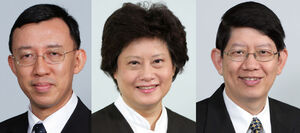
Court of Appeal judges Andrew Phang, Belinda Ang & Woo Bih Li
The couple's lawyer, Deborah Barker, said her clients, who had been in a romantic and sexual relationship for the past 16 years, were not seeking to change the Constitution, but only to enforce it. They were not asking for social change or the affirmation that male homosexual conduct was acceptable in Singapore. Rather, they were seeking a ruling that the majority could not impose its views, disguised as public morality, to target an unpopular minority group by restricting their intimate conduct in private which was legal for everyone else[156],[157],[158].
M Ravi, acting for Tan Eng Hong, argued that he was not asking the court to decide on questions of social policy but to deal with the issue of whether Section 377A unlawfully discriminated against a segment of society[159]. He said, “To characterise the potential violation of a fundamental right against a not insignificant segment of society as a matter of social policy that is up to the legislature is to completely disregard the function of this court. This case is squarely a matter of constitutional law. The legal issue the court is constitutionally mandated to determine is whether 377A unlawfully discriminates against a segment of our society.”
Ravi said Section 377A infringed on the right to equality under Article 12 and violated the rights of gay people to life and personal liberty under Article 9 of the Constitution. He argued that gay males and lesbians were treated differently under the law – Section 377A only criminalises sex between males, but not between females.
Presiding judge Andrew Phang said that the Court of Appeal should not, without a legal basis, “step into the shoes of parliament” which decided in 2007 not to repeal Section 377A and that a decision would be delivered in due course[160].
Court of Appeal rules 377A constitutional
In a 100-page judgment released by the Court of Appeal on 28 October 2014, Justices Andrew Phang, Belinda Ang and Woo Bih Li ruled that Section 377A was constitutional[161],[162],[163],[164],[165],[166]. The decision covered both contesting cases by gay couple Gary Lim and Kenneth Chee, as well as Tan Eng Hong (see Archive of Court of Appeal judgment in Lim Meng Suang & Tan Eng Hong v AG, 28 October 2014).
The court rejected Tan's lawyer, M Ravi's argument that Section 377A was absurd because it criminalised a minority based on a core aspect of their identity which was unchangeable[167]. It noted that there were still conflicting scientific views on whether sexual orientation was unchangeable so it was premature to express any conclusive views on it. In any case, the supposed unchangeability of sexual orientation was an "extra-legal" issue that was outside the remit of the court.
While Article 12 of the Constitution guaranteed equal protection, Singapore's legislature was allowed to pass laws that treated people differently if they were based on a "reasonable classification". The court used the "reasonable classification test" to determine whether a statute that differentiated was consistent with Article 12. Under this test, a statute that differentiated was constitutional if the classification was based on an "intelligible differentia", meaning a distinguishing feature that was discernible, and if the differentia bore a rational relation to the objective of the law. It maintained that the classification prescribed by Section 377A, i.e., men who performed acts of "gross indecency" with other men, was based on an intelligible differentia. After analysing historical documents on the enactment of Section 377A, the court ruled that there was a "complete coincidence" in the relation between that differentia and the purpose and objective of Section 377A - to enforce societal morality. As such, Section 377A passed legal muster under this test. The court went on to note that Article 12 did not address the issues involved in Section 377A. While the provision specifically prohibited discrimination based on religion, race, descent or place of birth, the words "gender", "sex" and "sexual orientation" were noticeably absent.
In conclusion, the judges noted the "vexing difficulty" in dealing with the emotional extra-legal considerations surrounding the topic, and emphasised that they could only consider the legal arguments. They stated, "While we understand the deeply-held personal feelings of the appellants, there is nothing that this court can do to assist them. Their remedy lies, if at all, in the legislative sphere."
In response, lawyer M Ravi commented, "Today’s decision has legitimised discrimination against gay men and approved the criminalisation of the conduct of their private lives by statute."[168],[169] He called the ruling a "huge step backwards for human rights in Singapore".
On their Indiegogo campaign page, the gay couple announced, "We are deeply disappointed with the judgment of the Court and though it has ruled that it is beyond its judiciary function to help the LGBT community, we are thankful that the justices have taken the time to consider this appeal in detail. We hope that parliament will be able to do so as well."[170]
Local LGBT groups[171],[172],[173],[174],[175],[176],[177] and international human rights organisations[178] also expressed their dismay at the ruling.
MARUAH's forum on 377A constitutionality judgment
On 1 February 2015, MARUAH organised a forum entitled, "Section 377A: What Does It Really Constitute?"[179]. It was held from 2:30pm to 5:30pm at #02-08, Heritage Place, 21 Tan Quee Lan Street, Singapore 188108. Advertisement: "The Court of Appeal has ruled that Section 377A is constitutional. What does this mean for the state of our civil liberties? Can we retain 377A, along with principles of equality and justice? Should gender and sexual orientation be included in our right to protection against discrimination? Come hear lawyers and academics speak on this matter."
The panel of speakers comprised M Ravi, Peter Low, Jack Tsen-Ta Lee and Alex Au. The moderator was Braema Mathi.
Ivan Tan comes out
In December 2014, Ivan Tan gave an exclusive interview published in Vol. 4 (2014) of Queer Asian Spirit E-Zine in which he revealed that he was the "Tan Eng Hong" that had started the 377A Constitutional challenge with human rights lawyer M Ravi in 2010[180]. Tan consented for the first time to having his photograph, which appeared at the bottom of the article, published in connection with the case. He had hitherto chosen to remain faceless to the public in the ongoing saga and had preferred to use his less well known Chinese name instead of the name by which most people knew him.
In the article, Tan talked about his spirituality which gave him to courage to launch the Constitutional challenge at great cost to his personal and professional life and to his family.
Ang Yong Guan moots referendum on Section 377A
On Sunday, 7 September 2015, during the hustings for the 2015 General Elections, SingFirst (Singaporeans First) candidate, psychologist Ang Yong Guan, announced:
"We will push for referendum on these issues. Another example is Section 377A. We respect the diverse views on these issues. These are moralistic issues. Issues where people hold strong views. And the only way to sort it out is to have a referendum. We need to have open debate to discuss these issues. And we need to embrace diversity. We can no longer make assumptions for people. Referendum is the way forward!" (see video:[181]).
Singapore's second Universal Periodic Review in 2016
- Main article: Universal Periodic Review: Singapore LGBT issues
During the second Universal Periodic Review (UPR) of Singapore's human rights record which took place at the United Nations, Geneva on Wednesday, 27 January 2016, delegations from Austria, Brasil, Canada, the Czech Republic, Finland, France, Greece, Norway, Spain, Sweden, the United Kingdom and the United States of America recommended that the republic decriminalise consensual sex between men and eliminate discrimination against LGBT people.
However, Singapore's representative, Ambassador-At-Large, Chan Heng Chee basically repeated what her predecessor said during the first UPR cycle in 2011 - that the island nation had a conservative population and that Section 377A, which criminalises male gay sex, would remain but not be enforced, showing that no progress whatsoever had been made in protecting the rights of LGBT Singaporeans over the span of four-and-a-half years.
Penal Code Review Committee will not consider repeal of 377A
In 2016, a Penal Code Review Committee was set up to conduct a wide-ranging review of the Penal Code. It called for marital immunity for rape to be removed and also for attempted suicide to be decriminalised. It also proposed further protection for minors from sexual predators, as well as enhanced punishment for crimes committed against children, domestic maids and adults with mental or physical disabilities who could not fend for themselves. The 169 recommendations included updating the 150-year-old Penal Code with new laws to tackle emerging crime trends, such as voyeurism and the spreading of nude or explicit images. However, the glaring omission was that the committee decided that the repeal of Section 377A would not even be considered.
On 5 September 2018, Law Minister K Shanmugam even called a meeting to brief Christian leaders about the upcoming Penal Code Review where he assured them that Section 377A would be untouched[182]. The meeting was attended by National Council of Churches (NCCS) President, Bishop Terry Kee. Shanmugam also held a special briefing with pastors and church leaders and to receive feedback from the churches on Tuesday, 18 September from 11:30am to 12:30pm at St Andrew’s Cathedral Prayer Halls A-B.
Indian's decriminalisation of gay sex and effect on Singapore
On Thursday, 6 September 2018, India's Supreme Court unanimously ruled to decriminalise consensual gay sex, with Chief Justice Dipak Misra calling Section 377 of the Indian Penal Code "irrational, indefensible and manifestly arbitrary". The historic ruling's reverberations extended to Singapore.
Tommy Koh encourages another 377A constitutional challenge
On the very same day that the Indian judgment was announced, Simon Chesterman, dean of the National University of Singapore's Faculty of Law, shared a New York Times story on the landmark event on his Facebook, congratulating a former classmate from India and others on the victory. In the comments section below Chesterman's post, veteran diplomat Prof Tommy Koh who was Ambassador-at-Large at the Ministry of Foreign Affairs wrote[183],[184],[185],[186]:
"I would encourage our gay community to bring a class action to challenge the constitutionality of Section 377A".
Koh also liked a Facebook post on Friday, 7 September 2018 by Janadas Devan, the chief of Singapore government communications, which opined: "Speaking personally, I support Tommy's position. 377A is a bad law; it is bad law. Sooner or later, it will go. Pray sooner rather than later."
K Shanmugam: Singaporean society to decide on gay sex laws
- See also: K Shanmugam's views on homosexuality
On 7 September 2018, Law and Home Affairs Minister K Shanmugam, responding to the momentous development in India, commented that laws would have to keep pace with changes in societal views and it was up to society to decide which direction it wanted to take when it came to legislation on gay sex[187],[188].
He said: “Singapore...on this issue, it is a deeply split society. The majority oppose to any change to section 377A - they are opposed to removing it. A minority - I have to say, a growing minority - want it to be repealed. The Government is in the middle. This issue relates to social mores, values - so can you impose viewpoints on a majority when it so closely relates to a social value system?”
"The law is there but generally there have been no prosecutions for private conduct. People openly express themselves as gay, you got the gay parade. Police even approved a licensing for it, no-one gets prosecuted for declaring themselves as gay," he noted. “So really when was the last time someone was prosecuted?”
“Speaking for myself, if you ask me, in a personal capacity, personal view - people's lifestyles, sexual attitudes, (we) really should be careful about treating them as criminals or criminalising that." "But again it will be wrong for me to impose my personal views on society or as a policymaker,” he qualified. “We live our lives, live and let live. If one side pushes, you will expect a substantial push back.”
The following day, on Saturday, 8 September 2018, Shanmugam said that whether Section 377A was repealed or amended would be a matter for Parliament to decide[189],[190]. He added that depending on the legislation, public opinion was "often relevant" during public policymaking in Parliament and "that is the jurisprudential approach that many Courts around the world, including Singapore, take. What the public thinks, whether it's a majority view or minority view, these are usually not considerations. You look at the law and you compare it against the Constitution," he added. However, when it came to whether a piece of legislation should be amended or repealed, that would be a matter for the Executive, which comprised the Cabinet, and Parliament. "The Executive proposes and Parliament decides, and usually, depending on the legislation, public opinion can be relevant," he explained. When asked whether Section 377A could be challenged again in Singapore courts, Shanmugam replied: "Technically, it is possible for people to bring a challenge and there are rules, jurisprudence on how such challenges will be dealt with by the Courts."
Tommy Koh's comments reignite debate on 377A
Members of the LGBT community cheered the note of support from Koh[191],[192],[193],[194]. The organisers of Pink Dot quoted him on their Facebook page, with the hashtag #tryagain and added: "Time to get rid of the archaic law left behind by the British!" Leow Yangfa, the executive director of Oogachaga, told The Straits Times: "We would like to thank Prof Tommy Koh for the very generous word of encouragement for us to persevere in our efforts to seek equality and justice for everyone, regardless of our sexual orientation and/or gender identity."
However, on the other camp, conservative leaders fretted not just about the implications of India's historic move but also about Koh's Facebook comment. Pastor Lawrence Khong, chairman of LoveSingapore, a network of more than 100 churches in Singapore, quipped: "I'm somewhat concerned, perhaps even disappointed, that a public and some would consider a government figure is making a statement like that. It does not come across as being helpful to building cohesion in society. In considering this issue, we must consider how people feel about it not only as an issue of personal right, not only as an issue of discrimination, but also, what are the ramifications and social cost for society?" He urged the Government to take a cautious approach on the issue. The Singapore Islamic Scholars and Religious Teachers Association (Pergas) had previously asked Muslims not to attend any event that "supports transgression" of Islamic teaching on the family, including events in support of the LGBT community.
Lawyer Lim Biow Chuan, who was Deputy Speaker of Parliament, said the Government had been taking a cautious stance on the issue for many years. It had stated for the record that it would "accommodate the sensitivities of different communities so that there is room for all to exist harmoniously together". 377A was not proactively enforced, and all citizens, regardless of their sexual orientation, were free to lead their lives and pursue their activities in their private space without fear or violence or personal insecurity. Lim said: "It's still a very divisive issue in Singapore. If you look at our society today, we can't raise the topic without everyone getting riled up. I'm not convinced that (reviewing 377A) would be the right move at this point in time - it would just divide society. But maybe in the future, as people's values develop and change, we may find a better time to do so."
At a book launch on Friday evening, 7 September 2018, Ho Kwon Ping, chairman of Singapore Management University, responding to a question from an audience of more than 100 tertiary students, said that he backed Prof Koh’s stance, adding that it was “fundamentally untenable” for the Government to keep 377A without enforcing it. He questioned what it was doing to the notion of the rule of law. “Either you have 377A and you justify to people, which (will cause) a furore, or you repeal. You cannot have your cake and eat it too, and say you want to please everybody, it’s on the statutes, it is illegal in Singapore, but you are not prosecuting.” His personal views were that to be anti-LGBT was to be “on the wrong side of history”, as the issue had long evolved from being one framed around one’s morality or sexual orientation to one of fundamental human rights. Ho, who was also executive chairman of Banyan Tree Holdings, advised that it would be good for Singapore to show that “we are on the right side of history, rather than to be the last country in Asia to repeal such a law. We are certainly not going to be the first country — we are not leading it — but it would be a bit embarrassing to be the last man standing.”
Opinion pieces on the issue were also published by Bertha Henson[195], Lianhe Zaobao[196],[197], SG Magazine[198],[199], The Independent SG[200],[201], Dear Straight People[202],[203] and Salt & Light[204],[205]. The Online Citizen raised the sensitive question of whether the PAP government was trading gay rights for Christian support[206],[207].
On 13 September 2018, the National Council of Churches of Singapore (NCCS) released a statement saying that it did not support the repeal of Section 377A, adding that it believed "the homosexual lifestyle is not only harmful for individuals, but also for families and society as a whole"[208],[209],[210],[211]. The statement went on to say that the Bible "clearly and categorically prohibits homosexual behaviour because it is a perversion of the way in which God has ordered human sexual relationships. The repeal of Section 377A would result in the normalisation and promotion of this lifestyle, which in turn would lead to undesirable moral and social consequences, a slippery slope as seen in some countries taking this step."
The NCCS' stance was rebutted in an article by pro-LGBT Christian Asher Mak who wrote that Christians saw LGBT rights as an issue to tackle but did not hear the stories of hurt and rejection experienced by the community[212]. Leslie Lee wrote to the Ministry of Home Affairs to raise the possibility that the statement issued by the NCCS contravened the Maintenance of Religious Harmony Act. He encouraged others who believed that Singapore should remain secular to write in too[213],[214]. Rio Hoe call into question the importance of "traditional family values"[215],[216].
Ipsos survey
On 10 September 2018, The Straits Times published the results of an online survey by Ipsos Public Affairs, an independent market research company, conducted over a period of four days from end-July to early August 2018 to understand the current social attitudes towards same-sex relationships[217],[218]. It showed that slightly more than half (55%) of the people in Singapore still supported Section 377A while 12% said they opposed it. 33% of the residents here were more accepting of same-sex relationships than he or she was five years before, while 35% were not.
A total of 750 Singaporean citizens and permanent residents aged 15 to 65 took part in the study. Sentiment varied according to gender, with males more likely to strongly support the law than females. Singapore residents aged 15 to 24 were more likely to oppose the law, while residents aged 55 to 65 were more likely to support it. People here were also asked the extent to which they agreed or disagreed with the statement "I believe that Singaporeans should be able to participate in same-sex relationships". 28% agreed with the statement, while 38% did not.
Ipsos said the findings indicated that attitudes towards the issue of same-sex relationships had changed and were likely to continue to change, albeit at a slow pace. This change was attributed to perceptions of shifts in Singapore's social norms with respect to same-sex relationships, increased conversations on social media and more direct exposure to same-sex relationships. Ipsos associate research director Robert McPhedran said: "This research indicates that the normative values of Singaporeans with respect to LGBTQ issues are gradually shifting. As has occurred in other countries globally, increased dialogue regarding same-sex relationships has contributed to higher acceptance among Singaporeans. This is particularly the case for the younger generation. Nonetheless, as PM Lee has previously noted, a social consensus remains far from being reached."
An online poll conducted by Yahoo! News on the same day showed that roughly half supported repealing Section 377A while the other half were in favour of keeping it[219],[220].
A 2014 survey of more than 4,000 Singapore residents conducted by the Institute of Policy Studies similarly found that people here were largely conservative. In the study, 78.2% of respondents said that same-sex relationships were wrong, while 72.9% were not in favour of gay marriage.
Blackbox Research survey
Market research consultancy Blackbox Research conducted a poll commissioned by Yahoo! News Singapore from 12 to 19 October 2018 on attitudes towards anti-gay laws using a sample size of 1000 Singaporeans and permanent residents[221].
One of the questions posed in the survey was: “Repealing Section 377A would lead to the breakdown of the family unit in Singapore. Do you agree?” 36% strongly agreed or agreed with the statement while some 28% strongly disagreed or disagreed with it[222]. The remaining 36% of respondents were neutral on the issue. By age group, fewer respondents aged 15-24 years old agreed with the statement, compared with those from the older age groups. Only 25% from the age group strongly agreed or agreed with the statement, followed by 35% who were neutral and 40% who strongly disagreed or disagreed with it. Among those aged 50 years and above, 41% agreed that the removal of the law would be detrimental to the Singapore family unit. About 33% of the respondents in the age group were neutral on the statement and 26% strongly disagreed or disagreed with it.
Over three in 10 Singapore residents agreed that the absence of a law criminalising sex between women was harmful to society[223]. Of the other respondents, about 26% strongly disagreed or disagreed with the statement, while 41% were neutral. Among the respondents by gender, more males strongly agreed or agreed with the statement at 35%, compared with 32% of females. The proportions of males and females who were neutral on the statement were 40 and 41%, respectively. The proportions of males and females who strong disagreed or disagreed with the statement were 25 and 27%, respectively. The proportions of respondents who strongly agreed or agreed with the statement were somewhat consistent across all age groups: 31% (15-24 years old), 35% (25-34 years old), 31% (35-49 years old) and 35% (50 years old and above). Among those who strongly disagreed or disagreed with the statement, the proportions were 34% (15-24 years old), 27% (25-34 years old), 24% (35-49 years old) and 25% (50 years old and above). The proportions who were neutral were 34% (15-24 years old), 38% (25-34 years old), 45% (35-49 years old) and 41% (50 years old and above).
More than half of Singapore residents strongly agreed or agreed that religious views and opinions should not influence Singapore’s laws[224]. Of the other respondents, about 20% strongly disagreed or disagreed with the statement, while 29% were neutral. By age group, the biggest proportion of respondents who strongly agreed or agreed with the statement was 54% among those who were 50 years old and above, followed by 52% (15-24 years old), 49% (25-34 years old) and 47% (35-49 years old). Among those who strongly disagreed or disagreed with the statement, the proportions were 25% (15-24 years old), 20% (25-34 years old), 17% (35-49 years old) and 21% (50 years old and above). The proportions who were neutral were 23% (15-24 years old), 31% (25-34 years old), 36% (35-49 years old) and 25% (50 years old and above). By gender, more males strongly agreed or agreed with the statement at 52%, compared with 49% of females. The proportions of males and females who were neutral on the statement were 28 and 31%, respectively. The proportions of males and females who strong disagreed or disagreed with the statement were the same at 20%.
Another question posed was: “Singapore should keep Section 377A even if it is not enforced. Do you agree?” Of the 1,000 respondents, 42% strongly agreed or agreed with the statement, with 19% strongly disagreeing or disagreeing[225]. The remaining 40% expressed a neutral stance on the issue. The results were largely consistent across male and female respondents. The proportions of male and female respondents who strongly agreed or agreed with the statement were 41% and 42%, respectively. The proportions of males and females who strongly disagreed or disagreed with the statement were 21 and 17%, respectively, while the remaining 38% of males and 41% of females were neutral on the issue. By age group, fewer respondents aged 15-24 years old strongly agreed or agreed with the statement, compared with those from the older age groups. Only 28% from the age group strongly agreed or agreed with the statement, compared with 41% (25-34 years old), 38% (35-49 years old) and 48% (50 years old and above). Among those who strongly disagreed or disagreed with the statement, the proportions were 27% (15-24 years old), 22% (25-34 years old), 19% (35-49 years old) and 15% (50 years old and above). The proportions who were neutral were 45% (15-24 years old), 38% (25-34 years old), 43% (35-49 years old) and 37% (50 years old and above).
Johnson Ong files fresh constitutional challenge
On Monday, 10 September 2018, barely 4 days after the historic striking down of Section 377 of the Indian Penal Code, then 43-year old internationally renowned disc jockey, producer and owner of a digital marketing agency Johnson Ong Ming, who went by the stage name of DJ Big Kid, filed a challenge with the High Court against Section 377A, arguing that the law was unconstitutional[226],[227]. Ong was represented by lawyers Eugene Thuraisingam and Suang Wijaya who acted pro bono. The Attorney-General was listed as the defendant and a pre-trial conference was fixed for 25 September 2018.
In his filing, Ong, who was in a relationship with a male partner for more than a year, said he was aware of the ruling in October 2014 that rejected the constitutional challenge filed by Tan Eng Hong and gay couple Gary Lim and Kenneth Chee but argued the court should depart from that precedent given international judicial developments since then, including the recent Indian Supreme Court judgment. He was also relying on a 2015 report by the United States Substance Abuse and Mental Health Services Administration (SAMHSA)which argued that "sexual orientation is unchangeable or suppressible at unacceptable personal cost". Ong also pointed out that Section 377A targeted only gay men and not gay women, and therefore contravened the right to equality enshrined in Article 12 of the Constitution.
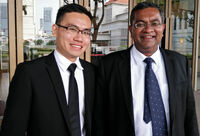
Ong's lawyers, Suang Wijaya & Eugene Thuraisingam
On Wednesday, 12 September 2018, Ong responded to queries from TODAY newspaper via email, saying that he believed repealing the section would put an end to the "online assaults, vitriol and abuse" against the LGBTQ community[228],[229]. He felt “energised” by the news of India’s ruling and decided to “take up” Prof Koh’s challenge. Ong's lawyers intended to adduce expert evidence which included proof that same-gender sexual orientation (including identity, behaviour, and attraction) and variations in gender identity and gender expression were “a part of the normal spectrum of human diversity and do not constitute a mental disorder”. If established that sexual orientation was unchangeable or not suppressible, they would argue that the criminalisation of consensual sex was a violation of human dignity and breached Article 9(1) of the Constitution, which stated: “No one shall be deprived of life and personal liberty save in accordance with law”. However, the court previously held that Section 377A did not contradict Article 9 as the phrase “life and liberty” was only to be used in reference to the protection of the personal liberty of a person from unlawful incarceration, and not to the right of privacy and autonomy in personal relationships. The lawyers additionally planned to argue that there had been many changes and legal developments around the world since the previous challenge was struck out, citing cases in the United States, Belize, Taiwan, Hong Kong and India[230],[231].
Ong, who was a Pink Dot 2010 ambassador[232],[233], also chose to mount the court challenge as LGBTQ groups were "not allowed to organise" and "don't see ourselves represented positively on mainstream media, if at all[234],[235]. "Without access to help and resources, navigating through life is a lonely and often stressful process for every LGBT Singaporean," he said. "Most importantly, I am not a criminal and I do not want to go through life being branded as one by my own country. It takes a psychological toll on you going through life thinking you are less than everyone else."[236]
Ong added: “I feel the current sentiment is that we have for decades silently suffered through enough discrimination at our workplaces, in our communities and within our own families, and not so recently, by conservatives, and religious organisations.” While he expected a “public backlash even to my own personal detriment” following his move, he reiterated that he was unperturbed and “ready for it”. He was “hopeful” and felt that he stood a good chance this time round. He explained that a successful court challenge would be "a monumental moment for not just the LGBTQ community but for all Singaporeans because gay rights, like women’s rights, like any subjugated minority rights, are human rights"[237],[238].
Another round of keep/repeal 377A petitions
Please Keep Penal Code 377A in Singapore
On 10 September 2018, an individual who published his name as Paul P. organised a petition to the Government on Change.org entitled, "Please Keep Penal Code 377A in Singapore"[239]. It was aimed at Singaporeans, who, like himself, believed that "the vocal minority" should not "impose their values and practices on the silent majority who are still largely conservative," and that marriage should only still be "an acceptable norm between a man and a woman". By the time of the petition's closure on 24 September 2018, it had garnered 108,917 signatures. Critics of the petition noted that most of the signatories supported keeping Section 377A on religious grounds, citing holy books and sacred texts on why they did not want LGBTQ lifestyles to be accepted. While well within their right to express their beliefs, a glimpse through all the submitted comments prompted the casual reader to seriously question their line of thought[240]. The online platform also allowed anyone to sign as many times as they wanted, was easy for bots to infiltrate/populate, did not collect relevant data, and did not distinguish foreigners from Singaporeans/PRs[241].[242]. Members from the anti-gay camp also individually wrote letters to Law Minister K Shanmugam and MPs in their constituency[243]. In late September 2019, a document was circulated online arguing for the retention of Section 377A[244],[245].
Ready4Repeal
- Main article: Ready4Repeal
Ready4Repeal is an online movement and petition for the repeal of Section 377A of the Singapore Penal Code. It was started in early September 2018 by Glen Goei and Johannes Hadi because Section 377A was being excluded yet again from the Penal Code Review to be held in 2019, and the founders of the movement did not want the LGBTQ+ community to be left behind. To date, it has garnered 50,495 signatures. The lead signatories are Professor Tommy Koh, Professor Kishore Mahbubani, Professor Walter Woon, Ho Kwon Ping, Claire Chiang, Hsieh Fu Hua, Theresa Foo & Harold Foo, Professor Tan Tai Yong and others.
Another petition by Gabriel Tang-Rafferty addressed to the Government chalked up 17,610 signatures out of the targeted 25,000 as of 12 September 2018.
Walter Woon in favour of repealing 377A because of "constitutional problem"
During the 12th NUS Tembusu Forum entitled "Are Human Rights Truly Universal?", which lasted two hours and was attended by about 250 students, held on the night of Tuesday, 18 September 2018, National University of Singapore (NUS) law professor Walter Woon, a former Attorney-General, said he was in favour of repealing Section 377A because of what he saw as a "constitutional problem"[246],[247]. The Government had said that the law would not be proactively enforced but Woon cited Section 35(8) of the Constitution to make the point that the powers to prosecute lay with the Attorney-General.
He said: "So we have a very dangerous precedent here where the political authorities are saying to the Public Prosecutor, who is supposed to be independent, there are some laws that you don't enforce. I find that very uncomfortable." He added that that homosexual sex was "absolutely impossible to prove" as a practical matter. "As a matter of principle, if these are consenting adults, why should it carry a jail term?" While considered a sin by certain religions, it could be accorded similar treatment to adultery and fornication, which are not crimes under the law, he elaborated, saying: "If it is a sin, it is between you and God."
NUS Centre for International Law chairman Prof Tommy Koh agreed that the provision should in principle be done without, but said abolishing it was "not so simple" given a potential political pushback. A majority of Singaporeans were against a repeal going by opinion polls, he pointed out. "The compromise is a law in the book, but Singapore will not enforce that law," he explained, adding that the Government's difficulty in balancing opposing opinions "should not be underestimated".
V.K. Rajah: "Section 377A: An impotent anachronism"
- Main article: Archive of The Straits Times article, "Section 377A: An impotent anachronism", 30 September 2018
On 30 September 2018, V.K. Rajah, who was Attorney-General from 2014 to 2017, who had been a judge on the Supreme Court and Court of Appeal, and who was one of the three judges who delivered the landmark ruling on Tan Eng Hong's constitutional challenge in 2012 (see above), penned an op-ed article for The Sunday Times entitled, "Section 377A: An impotent anachronism"[248]. In it, he argued for the decriminalisation of private sexual acts between males.
Bryan Choong files constitutional challenge
In November 2018, LGBT rights advocate Choong Chee Hong, better known as Bryan Choong, filed a case in the Supreme Court against the Attorney-General, stating that Section 377A was "inconsistent" with portions of the Constitution, and "is therefore void"[249].
Choong, then 41 years of age, was the former executive director of Oogachaga, a non-profit organisation working with the LGBT community. According to court documents, Choong stated that Section 377A was inconsistent with Article 9 of the Constitution, which states: "No person shall be deprived of his life or personal liberty save in accordance with law." The two other portions deemed "inconsistent" were: Article 12, which states that all persons are equal before the law and entitled to its equal protection; and Article 14, which states that every citizen of Singapore has the right to freedom of speech and expression. Article 14 also states that all citizens of Singapore "have the right to assemble peaceably and without arms" and have the "right to form associations".
Choong, who declined to be interviewed by the media, was represented by Senior Counsel Harpreet Singh Nehal from Cavenagh Law, as well as a team from Peter Low and Choo law firm comprising lawyers Remy Choo Zheng Xi, Priscilla Chia Wen Qi and Wong Thai Yong. Responding to queries from The Straits Times, the
Attorney-General’s Chambers (AGC) said it had received the papers and was studying them. The AGC spokesman added: "We are unable to comment further as the matter is now before the courts."
Chan Sek Keong analyses rulings on constitutionality of 377A
On Wednesday, 20 February 2019, the NUS Faculty of Law's Centre for Asian Legal Studies organised a seminar entitled, "The Criminal Law on Morality and Constitutional Equality: The Road Not Taken". It lasted from 3:00pm to 4:00pm and was held at the Moot Court at NUS' Bukit Timah Campus. The speaker was Distinguished Fellow Chan Sek Keong, former Chief Justice of the Supreme Court of Singapore and the chairperson was Adjunct Professor Kevin Tan of the NUS' Law Faculty. In 2015, the Court of Appeal dismissed the appeals of Tan Eng Hong and Lim Meng Suang and upheld the constitutionality of Section 377A. The Court of Appeal applied the reasonable classification test and held that by inserting this then-new provision into the Penal Code, the Straits Settlements Legislative Council had intentionally targeted male homosexuals, and that so long as all male homosexuals were treated alike, there was no discrimination within the meaning of Article 12(1) of the Constitution. In the talk, Chan analysed both decisions of the High Court and of the Court of Appeal and proposed an alternative but legally and constitutionally coherent reading of the law. Many in the audience, which comprised mainly NUS law undergraduates although there were also academic and practising lawyers present, made detailed notes of Chan's lecture. These notes would later be shared with other human rights lawyers who felt that Chan's expert legal opinion and arguments could be used in a new challenge against the constitutionality of Section 377A.
Paper published
8 months later, on Monday, 14 October 2019, Chan published an official 72-page academic paper based on his talk on e-First, the online prior-to-print publishing module of the Singapore Academy of Law Journal. It was entitled, “Equal justice under the constitution and Section 377A of the Penal Code - The Roads Not Taken”[250],[251].
The following were the paper's conclusions:
- Section 377A was not intended to cover penetrative sex, that is, anal or oral sex, when it was enacted in 1938 as the same offences had already been covered by Section 377 since 1872. Section 377A covers only non-penetrative sex, such as masturbation and other kinds of sexual touching and “lewd” acts.
- In so far as the Courts have decided that Section 377A does not violate the fundamental rights of equality before the law and equal protection of the law on the basis that Section 377A covers penetrative sex, the decisions are not binding on lower courts as being given per incuriam.
- If so, it is open to an applicant or defendant in a new action or prosecution to contend that Section 377A violates Article 12(1) of the Constitution on the ground that it unreasonably or arbitrarily discriminates against male homosexuals in respect of acts of gross indecency of a non-penetrative nature.
- If Section 377A had been enacted to criminalise penetrative sex covered under Section 377, it would have the effect of impliedly repealing the same offences in Section 377. If Section 377A had impliedly repealed those offences in Section 377 in 1938, those offences criminalised by Section 377A would have been impliedly repealed by Section 376(1)(a) in 2007 to the extent of their inconsistency, that is, with respect to consensual penetrative sex between males.
- Under Section 376(1)(a), consensual penetrative sex between males in private is no longer criminalised as an unnatural offence (because Section 377 has been repealed) but is punishable under Section 20 of the Minor Offences Act or Section 294(a) of the Penal Code, if performed in public.
- The legislative purpose or object of Section 377A determined at the time of its enactment in 1938 will always remain the same thereafter. Accordingly, the retention of Section 377A by Parliament in 2007 does not affirm or reaffirm its 1938 purpose.
- Section 377A was enacted for the purpose of dealing with the mischief of male prostitution and its associate activities (which involved male homosexual conduct) which were rife in 1938, and not because male homosexual conduct was not acceptable in Singapore society in 1938.
- The purpose of Section 377A as described above ceased to exist or was no longer valid in 2007 or 2013, or there was no evidence that similar conditions existed in 2007 or 2013. Accordingly, the legislative classification (or differentia) would no longer be reasonable and would not have rational relation to the purpose of Section 377A (having ceased to exist). Section 377A therefore cannot satisfy the requirements of the reasonable classification test and therefore violates Article 12(1).
- Section 377A, being a pre-constitution law, cannot be declared void for unconstitutionality because Article 162 requires any existing law to be construed to conform to the Constitution. Accordingly, the court has to interpret Section 377A by reading it to have a meaning that does not violate the Constitution. How Section 377A should be construed (or read) to conform to the Constitution depends on the nature of its inconsistency with Article 12(1).
- If the purpose of Section 377A has ceased to exist in 2007 or 2013, Section 377A may be construed to conform to the Constitution by reading it as a gender-neutral provision that criminalises non-penetrative sex of gross indecency committed in public.
PM Lee Hsien Loong: 377A will be around "for some time"
On Wednesday, 26 June 2019, Prime Minister Lee Hsien Loong took questions from the audience after his speech at the Smart Nation Summit held at the Marina Bay Sands. When asked by an unidentified member of the audience how Singapore's regulations could be made more diverse to attract tech talent, including those with other sexual orientations, Lee replied that Section 377A "will be around for some time" but it would not hinder the country's efforts to attract tech talent[252],[253].
On the issue of inclusiveness, Lee said that Singapore had been open to the LGBT community. “You know our rules in Singapore. Whatever your sexual orientation, you are welcome to come and work in Singapore,” he said. “But this has not inhibited people from living, and has not stopped Pink Dot from having a gathering every year. It is the way this society is: We are not like San Francisco, neither are we like some countries in the Middle East. (We are) something in between, it is the way the society is.” Such a “framework” would not hinder the technology scene here, added Lee. The Pink Dot event was set to take place that very weekend, on Saturday, 29 June 2019.
Pink Dot 2019 changes light-up message from "TOGETHER" to "REPEAL 377A"
Upset that PM Lee Hsien Loong had used Pink Dot as a showcase of how his government was accepting of the LGBT community while at the same time still refusing to repeal Section 377A, the organisers of Pink Dot 2019, who had made discrimination against LGBT people in Singapore their theme for the year, made a last-minute change of their climactic light-up message from "TOGETHER" to "REPEAL 377A". The tone of the event was also dramatically changed for the very first time in the group's 11-year history from one of docility to one of protest.
Roy Tan files constitutional challenge
On Friday, 20 September 2019, then 61-year old retired GP and long-time LGBT activist Roy Tan filed a new constitutional challenge in the High Court. He was represented by lawyer M Ravi who had joined Carson Law Chambers. The Attorney-General (AG) was listed as the defendant.

Roy Tan and pioneering human rights lawyer, M Ravi, after a Fridae interview by writer Ng Yi-Sheng in October 2011 prior to the landmark ruling by Justices VK Rajah, Andrew Phang and Judith Prakash on Tan Eng Hong's Section 377A constitutional challenge[1] which paved the way and made all subsequent challenges possible
According to Tan, his challenge was based on "novel arguments". For example, the Public Prosecutor had discretion on whether or not to prosecute an accused person under Section 377A and the Government had said that the law would not be enforced against acts done in private. This was incongruous with Section 14 of the Criminal Procedure Code, which requires the police to unconditionally investigate all complaints of suspected arrestable offences. "This subjects gay men to the potential distress of an investigation into private conduct where they have a legitimate expectation that the state will decline to prosecute. It represents not only a contradiction between the Public Prosecutor's prosecutorial discretion and the non-discretionary carriage of criminal justice on the ground but is also a restriction on their personal liberty, which is not consistent with Article 9(1) of the Constitution."
The case also sought to challenge the Court of Appeal's previous ruling in 2014 that Section 377A was constitutional. The 3-judge Court of Appeal had then rejected two separate challenges by Tan Eng Hong, who was also represented then by M Ravi, and a gay couple, Gary Lim and Kenneth Chee. The highest court in Singapore upheld Section 377A, rejecting arguments that the provision contravened the Constitution. The court held that Section 377A did not violate Article 9 as the phrase "life and liberty" referred only to the personal liberty of a person from unlawful incarceration and not to the right of privacy and personal autonomy.
As for Article 12, the court held that Section 377A passed a test used by the courts in determining whether a law complied with the constitutional right of equality. In Singapore, the courts had used the "reasonable classification test" to determine whether a statute that differentiated was consistent with Article 12. Under this test, a statute that differentiated was constitutional if the classification was based on an "intelligible differentia" – a discernible distinguishing feature shared by those who were treated differently – and if the differentia bore a rational relation to the objective of the law. The court held in 2014 that the classification prescribed by Section 377A - men who performed acts of gross indecency with other men - was based on an intelligible differentia.
The court also ruled that Section 377A fell outside the scope of Article 12, which forbids discrimination of citizens on grounds including religion, race and place of birth. The court observed that Article 12 did not contain the words "gender", "sex" and "sexual orientation", which related to Section 377A. Tan felt that the court had erred in ruling that Section 377A passed the test and disputed that the law was based on an intelligible differentia. He said acts of "gross indecency" may take place between men only, women only and a mix of men and women, but "such acts cannot be meaningfully distinguished across the three classes". "However, Section 377A only proscribes acts between males. There is therefore no intelligible differentia as Section 377A was intended to proscribe acts of gross indecency,” he added.
Tan's application was widely reported in the local[254],[255],[256],[257],[258] as well as international media[259],[260],[261],[262],[263],[264],[265].
During the pre-trial conference held on 8 October 2019, the court informed M Ravi that Tan's case, as well as the other two challenges filed in 2018 by Johnson Ong Ming and Bryan Choong were scheduled to be heard in chambers on 13, 15, 18, 20, 21 and 22 November 2019[266],[267],[268]. All three cases would be heard in the presence of all the lawyers arguing for their respective plaintiffs on each of the dates. Tan said: "The court may ask questions directed at the lawyers of the other cases while they are all in the courtroom at the same time."
Yale-NUS talk on striking down of India's Section 377
On 11 November 2019, Yale-NUS organised a talk by Indian lawyer Menaka Guruswamy entitled, "Litigating freedom: the battle to overturn India's Penal Code 377". An anti-LGBT petition addressed to the Government was rustled up by someone with the name of Esther Lee on CitizenGo. It carried the heading, "Say NO to YALE-NUS Event Titled "LITIGATING FREEDOM...” Using Foreigners To Influence Our Nation’s Court Of Law!" and garnered over 10,000 signatures[269],[270].
Commenting on Facebook the same day that the talk was held, Law Minister K Shanmugam wrote:
"Several people have written to me, objecting to a talk to be given by Dr Menaka Guruswamy, today. The talk is organized by Yale-NUS College. She is slated to speak on what happened in the Indian courts, on s377. There is also a Petition asking the Government to stop her talk.
The main objection appears to be that legal challenges to s377A are about to be heard in Court, and this talk could be sub judice.
I don’t see a significant risk of sub judice. Dr Guruswamy is a Senior Advocate of the Supreme Court of India. One may agree or disagree with her views, but I am sure she knows about rules relating to sub judice; and I don’t see an objection to her speaking about the law, and what happened in the Indian Supreme Court, where their s377 was successfully challenged."
Bryan Choong's challenge

High Court judge See Kee Oon.
At 2:30pm on Wednesday, 13 November 2019, in a High Court hearing held in chambers, Justice See Kee Oon presided over the constitutional challenge of Choong Chee Hong, better known as Bryan Choong. Choong's court submissions adduced fresh evidence using documents from the United Kingdom’s National Archives that were only recently declassified between 2014 and 2016[271],[272]. The newly surfaced historical files were argued as being vital in proving that Section 377A was meant to target commercial sex rather than to criminalise all consensual gay sex between men.
In their court filing, Choong’s lawyers - Senior Counsel Harpreet Nehal Singh of Audent Chambers, Remy Choo Zheng Xi, Priscilla Chia and Wong Thai Yong of Peter Low & Choo, and Jordan Tan of Cavenagh Law - argued that a 1940 report which was declassified in 2016 showed that the enactment of Section 377A by the British colonial legislature was in response to an “outbreak” of male prostitution in Malaya at the beginning of 1938. The report was addressed to George Gater, who held the title of Permanent Under-Secretary of State for the Colonies and made it “crystal clear” that there was a relationship between the two phenomena. The report detailed two cases in 1938, the year the law was enacted. The first, which took place three months before Section 377A came into effect, involved a colonial official named Reeves who was suspected of having relations with male prostitutes but was not charged initially as there was no proof. The second event involved another official, Rivaz, who was sacked as the charges, similar to those made against Reeves, were justified following the enactment of Section 377A. Choong’s lawyers also cited another case referencing a document dated 24 March 1938, which was declassified in 2014, in which a European warder of the Straits Settlements Prisons, Moses, resigned after being caught in January 1938 attempting to sodomise two male prostitutes. This document was a communication from Sir Thomas Shenton, governor and high commissioner of the Straits Settlements, to the secretary of state for the colonies. The lawyers argued that there was a “problem within the civil service of civil servants patronising male prostitutes” and that this gave rise to the law.
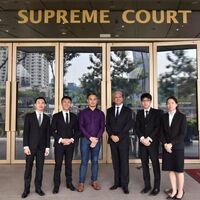
Bryan Choong and his legal team.
The legal team was building on arguments by gay couple Lim Meng Suang and Kenneth Chee whose challenge was rejected by the Court of Appeal in 2014. The lawyers considered a 1937 annual crime report, also used by the couple, that noted a discovery of a “widespread existence of male prostitution” in the British colony during the 1930s. The Court of Appeal in its 2014 ruling considered the possibility that Section 377A could have been enacted with the specific purpose of criminalising male prostitution, but ruled otherwise due to a lack of evidence. The court stated instead that the law was for “general application”. In their submissions, the lawyers said if the court held that the effect of Section 377A was not limited to commercial sex between men, the law would then be inconsistent with Article 12(1) of the Singapore Constitution, which states that all persons are equal before the law. They argued that the purpose of Section 377A, which was to criminalise male prostitution, did not match its current effects, and criminalises gay acts more generally. This way, the effect of Section 377A would be deemed “overly broad” and therefore, unconstitutional. The lawyers said: “It would be extraordinary to conclude in the face of the above evidence, in conjunction with the fresh documents, that the legislative purpose of 377A was anything other than (for the purposes of combatting male prostitution).” The legal significance of this conclusion, they said, is that if the purpose of Section 377A was to criminalise male prostitution only, then applying it to criminalise all homosexuals had gone overboard. “Should the analysis be any different just because the rights of a minority of the population (gay and bisexual men) are being trampled upon to further a narrow legislative purpose, which is to target male prostitution?” the lawyers asked.
The lawyers also floated a second argument that the colonial era rule was inconsistent with Article 14 of the Singapore Constitution, which protects the rights of all adults to freedom of expression through private consensual acts of sexual intimacy. They argued that Section 377A prohibited the right of “one class of adult citizens” – homosexual men – from expressing consensual acts of sexual intimacy. Describing the reach of the law as “absolute and categorical”, they said it had extended into the “privacy of one’s home and even long term, committed relationships”. Yet another part of their submissions argued that Section 377A was inconsistent with Article 12 of the Singapore Constitution, which states that all persons are equal before the law and are entitled to the equal protection of the law, and therefore unconstitutional. The lawyers questioned: “What would be the purpose of Article 12 if it only protected discrimination against the majority and not discrimination against the minority?”
Choong’s affidavit stated that the legal application was made because he believed that the right to equal protection under the Constitution could not just protect the personal intimacies and choices of some Singaporeans but not those of others. “What is at stake here goes to the very right of individuals like me, to define our humanity and to live this one life we each have in a way that is authentic and true to who we are,” he said. “Just as heterosexual couples have an interest in consensual intimacy, so, too, do adult gay couples.” Asserting that the original legislative purpose of Section 377A is “obscure and extremely cryptic”, he said: “The only ex post facto justification of Section 377A appears to be to send a message through the criminal law that the private intimate conduct of people like me is frowned upon by certain segments of our citizens. “There appears to be no other reason behind Section 377A.” He added: “Section 377A sends the message that gay men like me and many others are second-class citizens and lawbreakers, and this in turn adds to discrimination and misunderstanding throughout our society.” He also said that to say that there is nothing to fear because Section 377A will not be actively enforced is “not only inaccurate (gay men risk investigation), it adds insult to injury”. “It reinforces the fact that Section 377A serves no purpose but to discriminate against gay men,” he said.
Johnson Ong's challenge
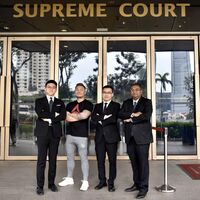
Johnson Ong and his legal team.
The second case, that of disc jockey Johnson Ong, was heard at 10am on Monday, 18 November 2019 in the High Court and also presided over by Justice See Kee Oon. Ong's legal team, consisting of Eugene Thuraisingam, Suang Wijaya and Johannes Hadi of the Eugene Thuraisingam law firm, argued that Section 377A violated Article 9 of the Constitution guaranteeing the right to life and personal liberty, and Article 14 guaranteeing freedom of expression[273].
The lawyers presented expert evidence from six medical professionals to back up their claims, including three called by Ong and three called by the AGC. Those called by Ong were British psychiatrist Dinesh Bhugra, a professor of mental health and diversity at the Institute of Psychiatry at King's College London; Dr Jacob Rajesh, a senior consultant psychiatrist at the Promises Clinic in Novena Medical Centre; and American public health and epidemiology professor Chris Beyrer of the Johns Hopkins Bloomberg School of Public Health. Those called by the AGC were Dr Cai Yiming, an emeritus consultant in the Department of Developmental Psychiatry at the Institute of Mental Health; retired geneticist John Tay Sin Hock, who was the former Head of Division of Human Genetics at the National University of Singapore; and Dr Derrick Heng Mok Kwee, group director of the Public Health Group in the Ministry of Health.
The experts on both sides largely agreed that sexual orientation could not be wilfully changed and that biological factors such as one's genes and non-social environmental factors such as exposure to different levels of hormones in the womb were contributors to one's sexual orientation. There was also no credible scientific evidence that "therapy" aimed at changing sexual orientation, such as reparative or conversion therapy, was safe or effective, they added.
But the experts differed on whether choice and social environmental factors like culture played a role in determining sexual orientation. Dr Cai said there is "very little we can scientifically conclude about whether there is choice in sexual orientation". Dr Tay said that genetics may play some part in determining sexual orientation but are not the sole cause of it, suggesting that culture plays a role as well. Ong's lawyers contended that the scientific literature cited by Dr Cai contradicted his conclusion. They also argued that Dr Tay did not cite any evidence to support his conclusion that cultural factors play such a role.
"It is absurd, irrational and discriminatory to criminalise a person on the basis of his natural, unchangeable identity and for non-harmful private acts," the team said in a statement to the media summarising their arguments. The lawyers noted that their case differed from a previous case brought against Section 377A in 2010 by Tan Eng Hong, whose lawyer had argued that there was overwhelming evidence that a person's sexual orientation was biologically determined. Tan had provided the court with statements from medical and scientific bodies which were not formally entered as evidence, they said. "For the first time, there is expert evidence before the courts on the nature of sexual orientation. In the previous cases, the court was only asked to take judicial notice of scientific facts which required a different legal test," the lawyers said in their statement.
Roy Tan's challenge
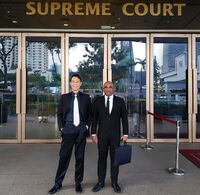
Roy Tan and his lawyer, M Ravi.
The third case, brought by LGBT activist and retired general practitioner Tan Seng Kee, better known as Roy Tan, was also heard on Monday, 18 November 2019 in the High Court[274]. Representing Dr Tan was human rights lawyer M Ravi who addressed the court on their arguments which centred on the incongruence between Parliament's decision not to proactively enforce Section 377A on the one hand, and important sections of the Criminal Procedure Code and the Penal Code on the other, and how this contravened Article 9(1) of the Constitution which states “No person shall be deprived of his life or personal liberty save in accordance with law”[275],[276].
Section 424 of the Criminal Procedure Code
One of Ravi's arguments was that the policy of non-proactive enforcement of Section 377A rendered the statute arbitrary in a way that it no longer constituted "law" within the meaning of Article 9(1), thereby making it unconstitutional. Ravi highlighted Section 424 of the Criminal Procedure Code (Duty to give information of certain matters) which states that the commission of such acts as mentioned under Section 377A, the intention to commit, or the knowledge of commission of such acts by others must be reported to the police. Failure to do so was punishable by up to one month's imprisonment or a fine of up to $1,500 as specified under Section 176 of the Penal Code (Omission to give notice or information to a public servant by a person legally bound to give such notice or information). Ravi argued that retaining Section 377A therefore doubly criminalised gay and bisexual men - on the first level, for committing acts prohibited under Section 377A and on the second level, for not reporting those acts to the authorities. As such, Section 377A, when read with Section 424 of the CPC and Section 176 of the Penal Code, infringed on the right of these men to life and liberty afforded to them under Article 9(1) of the Constitution. The lawyer also argued that Section 424 of the Criminal Procedure Code was another uncertain and inconsistent aspect of the enforcement of Section 377A since people might not be aware whether a failure to report such acts, given the Attorney-General’s non-prosecution policy, constituted a reasonable excuse not to do so. Furthermore, Ravi argued that Section 424 obliged gay and bisexual men to report their sexual activities or intentions to the police while also imposing an obligation on their friends, families, and even neighbours to do the same. He said: “This leads to an absurd and arbitrary application of Section 424 on openly gay and bisexual men as it may subject them to surveillance by their acquaintances as well as to the humiliating and degrading acts of enforcement mandated by the law.”
On the matter of obligating health professionals to report patients who violate Section 377A as well, Ravi argued that while an affidavit filed by Dr Derrick Heng on behalf of the AG asserted that the Ministry of Health “will not require its healthcare professionals to report patients to the police if they are aware that the patient has male sex partners, or even if the patient is HIV-positive,” this was also contrary to Section 424[277]. The latter rendered criminal the omission of healthcare professionals in the civil service to report their patients to the police if they were aware of the sexual acts of their gay or bisexual patients. In this regard, contrary to the AGC’s assertion, the healthcare professionals were faced with the spectre of prosecution.
In terms of the enforcement of Section 377A, Ravi said: “The discretion vested in the Attorney-General towards the non-prosecution of sexual conduct between consenting male adults in private needs to be considered against this statutory obligation imposed on the police to investigate complaints.” He added that the circumstances in which the private sexual conduct between two consenting men would be investigated or prosecuted were unpredictable and vague.
Section 119 of the Penal Code
The third prong of this argument was that Section 119 of the Penal Code (A public servant concealing a design to commit an offence which it is his duty to prevent) also made it an offence for public servants not to take action against those who might commit offences, including those outlined under Section 377A. In fact, it was the duty of a civil servant to prevent the commission of offences or risk being caught by Section 119. To illustrate this, the lawyer gave an example of a domestic worker reporting to the police that her male employer was having sex with a consenting adult male. In such a case, the police are mandated by law to prevent the offence from taking place. Failing to do so would result in a criminal penalty as outlined in Section 119 - "imprisonment for a term which may extend to one-half of the longest term provided for that offence, or with such fine as is provided for that offence, or with both". Ravi argued that based on the evidence that the police will never, in practice, investigate allegations of private consensual sexual activities between men, it followed that Section 377A was arbitrary since it had no practical effect on law enforcement or alleged aims behind the legislation. “Instead it only serves to identify gay and bisexual men as potential criminals and gives rise to fear that they may, one day, be prosecuted,” he said.
In his conclusion, Ravi said “A measure will not qualify as “law” where it is so absurd or arbitrary a nature that it could not have been contemplated by the framers of our constitution as being “law” when they crafted the constitutional provisions protecting fundamental liberties. By extension, a provision which occasions an approach to enforcement which is absurd or arbitrary may also infringe Article 9(1).”.
AGC's response
In presenting its arguments to Justice See Kee Oon on Wednesday, 20 November 2019 in response to the three challenges before the High Court, the Attorney-General’s Chambers said that the question of whether or not to repeal Section 377A was a deeply divisive socio-political issue that should be decided by Parliament, not the judiciary, noting that this was the same position adopted by the Court of Appeal in 2014[278],[279],[280]. In a 124-page written submission, the AGC noted that in 2014, the Court of Appeal had dismissed a similar challenge. It ruled then that the law, which criminalised acts of "gross indecency" between men, was consistent with the Constitution of Singapore. The AGC said in its submission that the High Court was bound to follow the decisions of the Court of Appeal, which was the highest court in Singapore, and should therefore dismiss the three recent cases. This was a key point presented by the AGC's lawyers, Deputy Chief Counsel Hui Choon Kuen, Deputy Senior State Counsels Denise Wong and Jeremy Yeo, and State Counsel Jamie Pang.
The AGC asserted that the role of the courts was to apply the law, not to determine social policy. It also noted that in other major jurisdictions such as Britain and Hong Kong where laws similar to Section 377A had been abolished, this was done by the legislature. A repeal of Section 377A would involve complex social and political considerations. These included religious sensitivities, conservative views on family and non-religious or non-traditional views that needed to be finely balanced. Parliament, which dealt with complex socio-political matters, was better placed to handle such issues compared to the judiciary, which was constrained by more restrictive procedures, the AGC said. It noted that the courts could only receive information that satisfied the rules of admission of evidence, but Parliament could consider information that did not, such as public sentiment. Parliament would also be able to implement "change management" if it decided to repeal the law, such as engaging relevant communities and their leaders to explain the rationale for the change and assuage any unfounded concerns.
Indian Supreme Court's decision irrelevant to Singapore
They argued that an Indian court’s decision to lift a ban on consensual gay sex in September 2018 was irrelevant to Singapore as the two countries took vastly different approaches to constitutional interpretation and review. Unlike the Indian courts, which recognised concepts such as “transformative constitutionalism”, the “progressive realisation of rights”, and the “doctrine of non-regression”, the Singapore courts did not view themselves as a driver of social change or transformation. And as the Singapore Constitution currently stood, there was no “free-standing” right to sexual freedom or privacy, so it could not be said that it was absurd and arbitrary to deprive homosexuals of their chosen form of sexual conduct. Also, concepts like privacy, human dignity and sexual identity could not be conferred the status of constitutional rights as they remained formless in Singapore versus “concrete rights” such as religion, free speech and freedom of movement, which were upheld with qualifications, within the context of larger interests such as public order and security.
“Unqualified rights inherently contradict a key tenet of our Constitution, which is that the interest of the larger community is placed over the interest of the individual,” they added. The Constitution also called it a violation only when laws discriminated against a citizen on grounds of religion, race, descent, or place of birth, they pointed out. The words “gender”, “sex” and “sexual orientation” were absent in this part of the Constitution, whereas the Indian Constitution expressly prohibited discrimination against any citizen on the grounds of sex. Renegotiating these areas was, anyway, out of the court’s reach, the state counsels stressed, as Parliament had the final say on the ambit of public order and morality. “It is Parliament, and not the courts, that should decide the deeply divisive socio-political issue of whether Singapore should continue to criminalise male homosexual sex acts,” they argued.
Against ex-Chief Justice's comments
The submissions also addressed the widely-discussed arguments of former Chief Justice Chan Sek Keong, although he was not an applicant. The state lawyers submitted that Chan's argument, that the original purpose of Section 377A was "impliedly repealed" when Section 377 was repealed in 2007, did not hold water. Section 377 covered penetrative sex acts "against the order of nature". In that same Bill that Parliament passed in 2007, Section 376 was added to criminalise non-consensual penetrative sex with a sub-section dealing with male-on-male acts of this type. “With all due respect, his argument is unconvincing,” the state counsels wrote. “It does not logically follow that just because a provision making non-consensual penetrative sex illegal is enacted, an earlier provision covering consensual penetrative sex is impliedly repealed.” They went on to note that Parliament proceeded on the basis that Section 377A covered penetrative sex acts and, after a debate, decided to retain it as a reflection of social morality concerning male homosexual sex acts. “How can we find that Parliament implied a result completely opposite to the result that Parliament expressly came to?” they said.
Disagreement on 377A's narrow purpose to fight male prostitution
Chan had also argued that the original purpose of Section 377A, when it was enacted in 1938, was meant to deal with a rising trend of male prostitution. This was a point advanced by Bryan Choong’s lawyers as well, who backed their argument with newly declassified documents from the United Kingdom’s National Archives. But the state counsels said Section 377A was listed under the heading “Unnatural Offences”, which suggested that its purpose was linked to the inherent quality of the acts it prohibited. Therefore, Section 377A should be seen to be for “general application”, and not that it was to serve a narrow purpose of combating male prostitution, they said. Making mention of Chan’s argument that Section 377A served no legitimate purpose since the prevailing policy was to not proactively enforce it, they added: “Section 377A is fully able to serve its purpose, which is to send a certain moral signal, by its mere existence regardless of whether and how it is enforced. This is a “common-sense argument.”
377A not as absurd as law banning left-handed people from using lifts
Regarding Johnson Ong’s arguments that Section 377A violated the Constitution as it was “absurd and arbitrary" to criminalise a person on the basis of his natural, unchangeable identity, the state counsels argued that a law could only be considered as such if it was regarded by “all reasonable persons as clearly absurd and arbitrary”. While a law that banned left-handed people from using lifts might qualify as absurd and arbitrary, “clearly, a law that prohibits male homosexual sex acts, in private or public, is not one that all reasonable persons in Singapore would think was absurd and arbitrary”, they said. Such an extremely high threshold was required to guard against judicial overreach and the collapse of the separation of powers between different organs of state, they added.
On Ong’s argument that homosexuality was inborn and immutable, they argued that it was clear that all experts consulted by him and the Government agreed that sexual orientation was the result of a complex interplay between biological and cultural factors. While genetics may play some part in determining sexual orientation, it was not the sole cause, they said, further noting that the state of scientific knowledge had not significantly progressed since 2014, when Section 377A was last challenged before the courts. They also argued that Section 377A was not to punish someone based on his mere existence, but targeted homosexual sex acts. Even Ong’s experts had acknowledged that a person experiencing homosexual attraction could voluntarily control whether to perform the act or not, they added.
Arguments against Roy Tan's position
In its statement to the media, the AGC also addressed Dr Roy Tan's lawyer, M Ravi's point that other laws such as Section 424 of the Criminal Procedure Code (CPC) made it legally obligatory for anyone to report those who violated Section 377A. This included gay men themselves, their friends or family members, and their medical care providers. Parliament's stance that Section 377A would not be proactively enforced led to "an inconsistent and arbitrary application of criminal procedure", Ravi had argued. It was also incongruent with the mandatory obligation under Section 424 of the CPC. The AGC responded in its statement: "The Attorney-General has already stated that where the conduct in question was between two consenting adults in a private place, the Public Prosecutor's position is that, absent other factors, prosecution under Section 377A would not be in the public interest. It would naturally follow from this position that any prosecution under other provisions which would contradict the non-prosecution position of Section 377A would likewise not be in the public interest."
Ravi had also argued that Section 377A was not consistent with parts of the Constitution addressing personal liberty, equal protection, and freedom of speech, assembly and association, so it should be considered void by virtue of Article 162 of the Constitution. Article 162 allowed for modifications, adaptations, qualifications or exceptions to be made to laws if they were not consistent with the Constitution, but the state counsels’ claim was that Section 377A conformed with the Constitution. The AGC's responded: “What the court does not have the power to do under Article 162 is to strike down the law, whether in whole or in part. The applicant was clearly asking the court to do something which it has no power to do.”
High Court dismisses all 3 actions
The High Court's verdict was delivered in chambers 4 months later, on Monday, 30 March 2020 at 3pm. Justice See Kee Oon dismissed the court action of all 3 men and initially announced that the full judgment would be delivered at a future date. However, it was eventually released only a few hours later[281],[282]. See said the decision by the Court of Appeal in 2014 remained binding[283],[284]. "I am unable to agree that there are cogent reasons for a Singapore court to be able to depart from binding decisions of the highest court in the land," he said in a 105-page written judgment. The High Court had reached the same conclusions as the Court of Appeal, even after taking into account new material put forth by the plaintiffs.
Regarding Johnson Ong's arguments that Section 377A criminalised gay men on the basis of their identity, Justice See said there was no comprehensive scientific consensus on whether a person's sexual orientation was immutable. The court was also not the appropriate forum to seek resolution of a scientific issue that remained controversial, he added. "Any controversy is best addressed by the relevant scientific community itself. Ultimately, the issue is an extra-legal one that does not come under the proper purview of the courts," he explained. He also noted that Section 377A criminalised homosexual acts and not a person's sexual orientation or identity in itself. "Hence, sexual orientation per se, or whether the male person in question identifies himself as bisexual, heterosexual or homosexual, is completely irrelevant," he pointed out. "A heterosexual male can equally be prosecuted under Section 377A if he commits such an offence."
Rejecting Bryan Choong's arguments that Section 377A was originally intended to curtail the spread of male prostitution, not consensual private sexual acts between men, and that the law was not intended to criminalise penetrative sex, which was covered under Section 377, a separate law that was repealed in 2007, Justice See said Section 377A was intended to safeguard public morals generally as well as enable enforcement and prosecution of all forms of gross indecency between men. He elaborated: "Section 377A is not limited to commercial sex between males. It is framed widely enough to cover all forms of male homosexual activity including penetrative and non-penetrative sex, whether in public or in private and with or without consent." He also noted that Section 377A did overlap with the now-defunct Section 377, but that there was "no exclusionary intent" to avoid this overlap when the laws were introduced. The Penal Code also contains "numerous examples of overlapping offences", he added.
Roy Tan had argued that it was "absurd and arbitrary" to allow the law to remain on Singapore's statutes given that the Government's official policy position was non-enforcement in respect of consensual homosexual acts in private between men. But Justice See noted that Tan had taken issue with the enforcement of Section 377A and not the constitutionality of the law itself. These issues were separate and distinct, he said, adding that the manner in which a provision was enforced, even if arbitrary, could not in itself render the provision unconstitutional. "The appropriate recourse in such a situation would be to seek administrative review, not constitutional review," he advised.
On Tuesday, 31 March 2020, all 3 plaintiffs announced that they would be appealing the High Court's ruling[285].
Roy Tan files High Court application for mandatory order compelling Cabinet to move Bill in Parliament to repeal 377A
- See also: Remedies in Singapore administrative law
On 1 December 2020, Roy Tan, filed an application in the High Court seeking a declaration that Section 377A of the Penal Code was incongruent and inconsistent with Sections 119 and 176 of the Penal Code, Sections 17 and 424 of the Criminal Procedure Code, Section 9A (1) of the Interpretation Act and Articles 9(1) and 12(1) of the [of the Republic of Singapore]. He also argued that the Attorney-General’s position - that it would naturally follow that any prosecution under other provisions which would contradict the non-prosecution stance for male homosexual adults indulging in consensual sex in private would likewise not be in the public interest - rendered Section 377A otiose a fortiori.
Tan, represented by lawyer M Ravi, furthermore sought a mandatory order compelling the members of the Cabinet to move a Bill in Parliament to repeal Section 377A because the latter has become dead letter and its retention in the face of Sections 17 and 424 of the Criminal Procedure Code, Sections 119 and 176 of the Penal Code and Section 9A of the Interpretation Act was unlawful due to the Executive’s decision not the enforce Section 377A. Under Section 9A (1) of the Interpretation Act, the courts were required to interpret a written law in a way that promoted the purpose or object underlying that law. Parliament's undertaking not to proactively enforce Section 377A rendered the courts unable to perform their legal obligation.
See also
- Singapore gay history
- Singapore gay equality movement
- Lee Kuan Yew's views on homosexuality
- Archive of "Parliamentary debate on Penal Code (Amendment) Bill, 22 Oct 2007"
- Archive of "Parliamentary debate on Penal Code (Amendment) Bill, 23 Oct 2007"
- Archive of parliamentary debate on Section 377A, 22 & 23 October 2007
- Archive of Court of Appeal judgment in Lim Meng Suang & Tan Eng Hong v AG, 28 October 2014
- Archive of High Court judgment in Lim Meng Suang & another v AG, 9 April 2013
- Archive of High Court judgment in Tan Eng Hong v AG, 2 October 2013
- Archive of Court of Appeal judgment in Tan Eng Hong v AG, 21 August 2012
- Archive of judgment of High Court judge Lai Chiu Siu, 15 March 2011
- Archive of "“Abominable Type of Vice” Rife In Singapore", Singapore Free Press and Mercantile Advertiser, 28 March 1941
- Archive of "STAFF OFFICER ON TRIAL IN POLICE COURT", Singapore Free Press and Mercantile Advertiser, 16 January 1941
- Archive of ""NO DOUBT WHATEVER" OF STAFF OFFICER'S INNOCENCE", Singapore Free Press and Mercantile Advertiser, 17 April 1941
- Archive of talk, "Gay Law: Emancipation And Emasculation" by Lim Wee Kuan, 1 October 2002
- Archive of "A heftier list of s.377A cases", Mohan Gopalan, May 2007
- Section 354 of the Singapore Penal Code
- Section 294A of the Singapore Penal Code
- Sub judice in Singapore law
References
- Section 377A on Singapore Statutes Online:[286].
Further reading
- Jack Tsen-Ta Lee, "377A: What does it really constitute?", MARUAH, 31 January 2015[287].
- Jack Tsen-Ta Lee, "Equality and Singapore’s First Constitutional Challenges to the Criminalization of Male Homosexual Conduct", School of Law, Singapore Management University, 1 June 2015[288].
- Tham Lijing, "377A: Law and Morality", Law Gazette, January 2015[289].
- George Radics, "Section 377A in Singapore and the (De)Criminalization of Homosexuality", Reconstruction Vol. 15, No. 2, 2015[290].
- Sudhir Thomas Vadaketh, "On S377A and gay rights in Singapore", "Musings from Singapore" blog, 13 June 2014[291].
- George Baylon Radics, "Decolonizing Singapore's Sex Laws: Tracing Section 377a of Singapore's Penal Code", Columbia Human Rights Law Review, Vol. 45, No. 1, 2013, 15 December 2013[292],[293].
- Chen Jianlin, "Singapore's Culture War Over Section 377A: Through the Lens of Public Choice and Multi-Lingual Research" Law & Social Inquiry 38.1 (2013): 106-137[294],[295].
- Alex Au, (March 2011). "High Court waves away 377A controversy". Yawning Bread. [296]
- Alex Au, (March 2011). "When you should vote PAP". Yawning Bread. [297]
- Chen Jianlin, (1 October 2010). "Singapore's Culture War Over Section 377A: Through the Lens of Public Choice and Multi-Lingual Research". Social Science Research Network.[298]
- Prof Lakshmi Penna, "Homosexual acts: Indian law differs from Section 377A of Penal Code here", Straits Times forum, 8 July 2009[299].
- Ted Young, (24 October 2007). "Our Time Has Come". Trevvy. [300]
- Douglas Sanders, (October 2007), (PDF). "377 – and the unnatural afterlife of British colonialism". Fridae. [301]
- Alex Au, (May 2007). "Why Section 377A is redundant". Yawning Bread. [302]
- Mohan Gopalan, (May 2007). "A heftier list of s. 377A cases". Yawning Bread. [303],[304]
- Douglas Sanders (30 March 2007). "The mystery of 377". Fridae.[305]
- Alok Gupta, (November 2006). "Section 377 and the Dignity of Indian Homosexuals". The Economic and Political Weekly.[306],[307]
- Alex Au, (March 2005). "The picture that emerges". Yawning Bread. [308]
- Alex Au, (March 2005). "List of Section 377 and 377A cases". Yawning Bread. [309]
- Alex Au, (January 2004). "The blowjob that blew down our oral sex law". Yawning Bread. [310]
- Lynette Chua J. Kher Shing (2003). "Saying No : Sections 377 and 377A of the Penal Code". Singapore Journal of Legal Studies: 209–261.
External links
- Repeal377A.com – campaign for the repeal of Section 377A of the Penal Code:[311]
- Singapore Daily page on 377A – collection of blogger postings on Section 377A of the Penal Code:[312]
- A YouTube playlist of all archived news clips relating to Section 377A by Roy Tan:[313]
- List of documents relating to LGBT rights in Singapore on the International Gay and Lesbian Human Rights Commission (IGLHRC) website:[314]
Acknowledgements
This article was written by Roy Tan.
